NEWS AND EVENTS
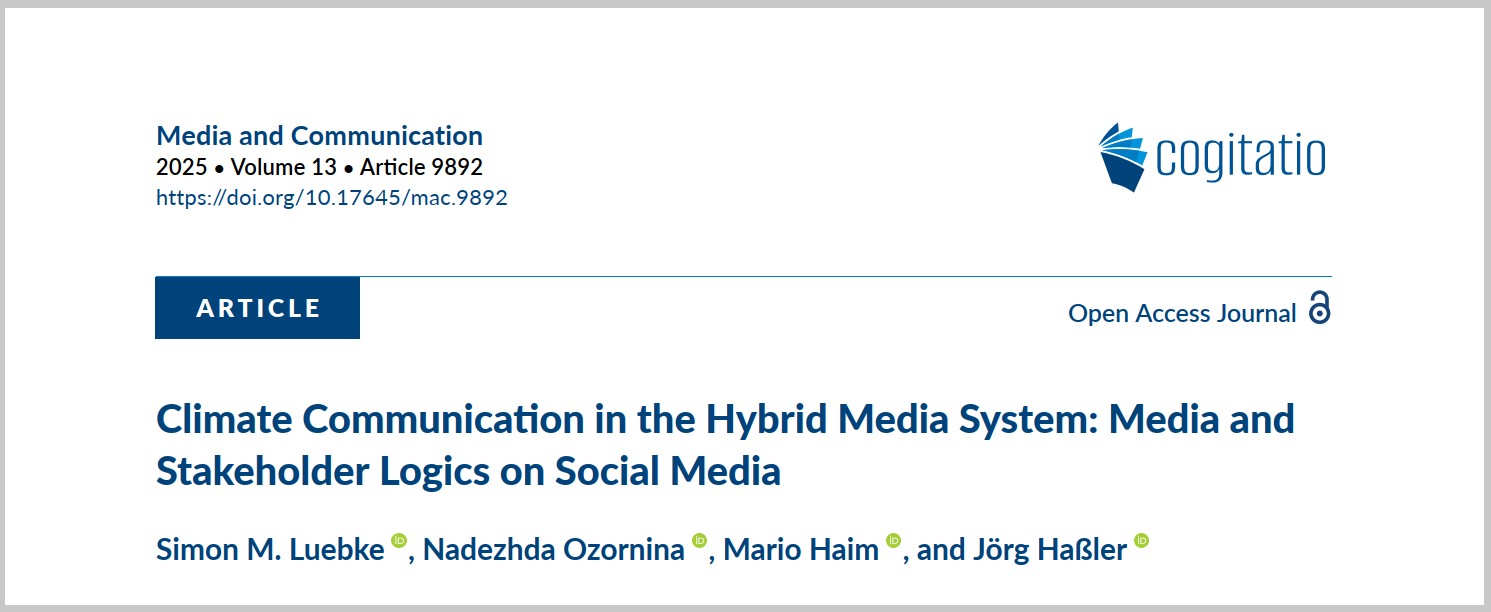
June 17, 2025 | Publication on Climate Communication in the Hybrid Media System
How do political actors and media outlets discuss climate change on social media? This very question is the focus of our latest publication, which was recently published in the journal Media and Communication. In the article, Simon Luebke, Nadezhda Ozornina, Mario Haim, and Jörg Haßler analyze posts on TikTok, Facebook, Instagram, and YouTube created by climate stakeholders and media organizations in Germany during the 2023 UN Climate Change Conference (COP28) in Dubai.
The paper titled ‘Climate Communication in the Hybrid Media System: Media and Stakeholder Logics on Social Media’ examines the extent to which media organizations and political actors follow different communicative logics when addressing climate change. Given today’s hybrid media landscape, where various actors interact on social platforms, we explore whether these distinct logics are beginning to converge. Over a 16-day period surrounding COP28, we collected and analyzed all social media posts from high-reach media outlets, as well as from individuals and institutions that influence climate discourse and policy in Germany. In total, we manually coded and systematically analyzed 1,050 posts using a standardized manual content analysis.
Our findings reveal clear distinctions. Media outlets tend to frame climate change as a political issue, emphasize its negative consequences, and focus slightly more on individual figures (personalization). In contrast, political actors are more likely to use strategic frames, discuss the climate crisis beyond the context of COP28, and address specific policy measures. Interestingly, posts from both groups receive higher engagement (likes) across platforms when they adopt a populist framing. That is, when they criticize current climate policies and express skepticism about the necessity of climate protection measures.
The article is part of a special issue on “Journalism in the Hybrid Media System” and can be accessed (open access) via the link below.
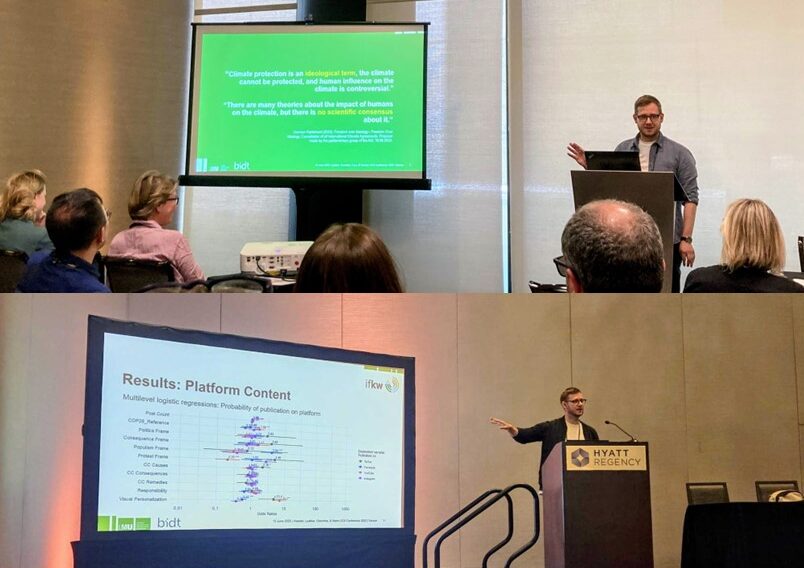
June 12 – 16, 2025 | KLIMA-MEMES at ICA25 in Denver
From June 12–16, the 75th annual conference of the International Communication Association (ICA) took place in Denver. The KLIMA-MEMES project was featured in two presentations that showed research by Simon Lübke, Nadezhda Ozornina, Mario Haim, and Jörg Haßler about climate communication on social media.
The first paper, titled „Fragmentation of Digital Climate Change Discourse?,“ presented a comparative study of how key actors in the German climate discourse communicate on Facebook, Instagram, TikTok, and YouTube. The authors observed clear differences between political actors, such as parties, politicians, and NGOs, and climate journalists. While journalistic content tends to be event-driven and personalized, emphasizing negative aspects of climate change, stakeholders treat climate change as a broader, ongoing issue independent of events like climate summits and frame it in ways that align with their own interests.
The second paper, titled „The Rise of Climate Change Skepticism in Germany,“ examined the climate communication strategies employed by the far-right political party Alternative für Deutschland (AfD). The authors compared climate-related content from all German political parties represented in the Bundestag during the UN Climate Change Conference (COP28) in Dubai. One notable finding was that the AfD communicated about climate change more frequently than previous research suggested. The party primarily expressed skepticism about the urgency of the climate change issue and questioned the necessity of climate protection policies.
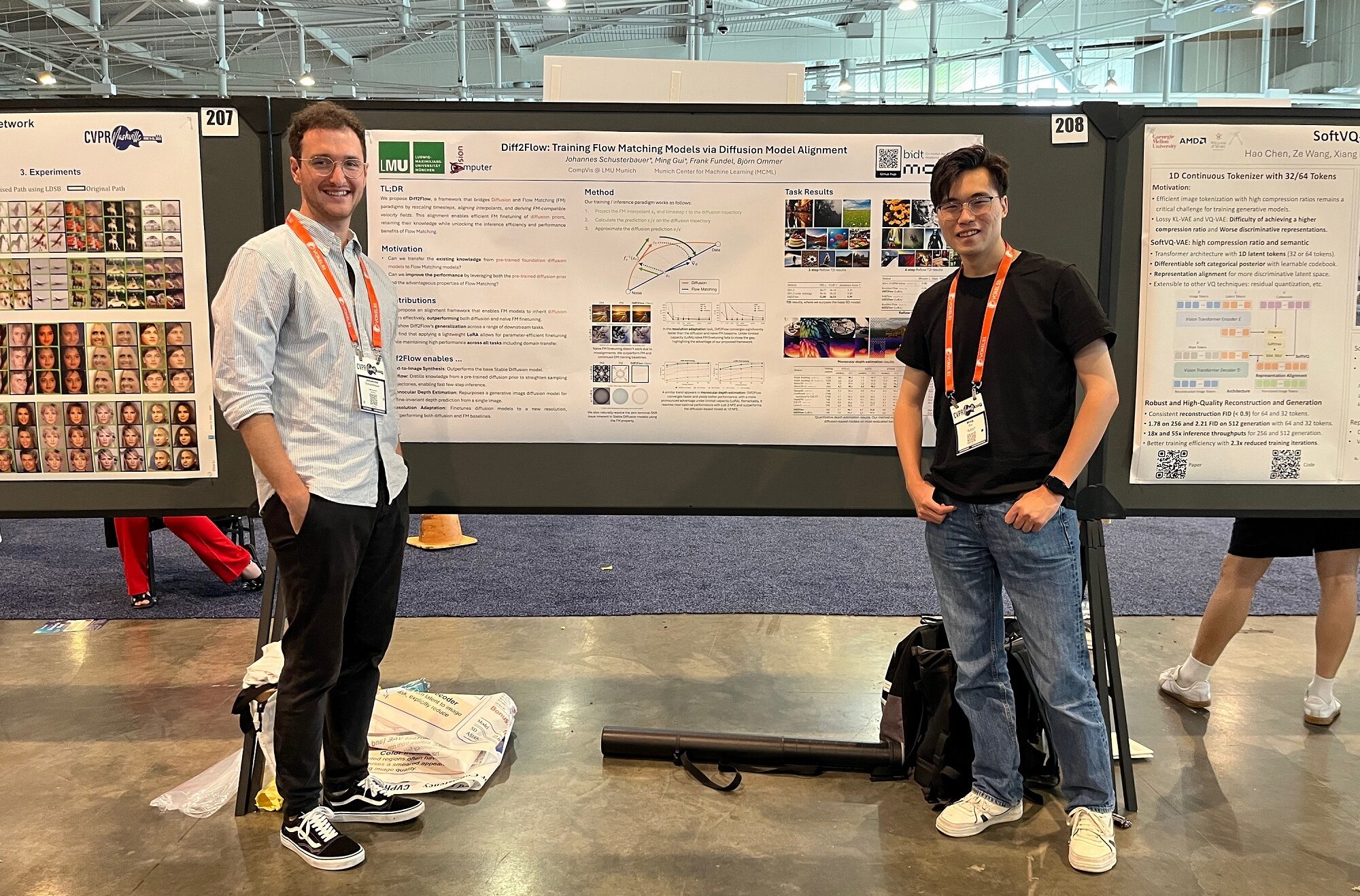
June 15, 2025 | CVPR: Presenting Diff2Flow in Nashville
From June 11–15, the IEEE/CVF Conference on Computer Vision and Pattern Recognition (CVPR) took place in Nashville – and our colleagues from the KLIMA-MEMES project were there to present a poster. Johannes Schusterbauer, Ming Gui, Frank Fundel, and Björn Ommer presented their research titled „Diff2Flow: Training Flow Matching Models via Diffusion Model Alignment.“ In their work, they explore a central question in the field of generative AI: How can we transfer the knowledge of a trained diffusion model to a faster flow-matching model for image generation? To tackle this, the team proposes a novel framework called Diff2Flow. It allows this transfer to happen without the need to retrain the entire model, making generative AI both faster and more efficient.
Abstract: Diffusion models have revolutionized generative tasks through high-fidelity outputs, yet flow matching (FM) offers faster inference and empirical performance gains. However, current foundation FM models are computationally prohibitive for finetuning, while diffusion models like Stable Diffusion benefit from efficient architectures and ecosystem support. This work addresses the critical challenge of efficiently transferring knowledge from pre-trained diffusion models to flow matching. We propose Diff2Flow, a novel framework that systematically bridges diffusion and FM paradigms by rescaling timesteps, aligning interpolants, and deriving FM-compatible velocity fields from diffusion predictions. This alignment enables direct and efficient FM finetuning of diffusion priors with no extra computation overhead. Our experiments demonstrate that Diff2Flow outperforms naïve FM and diffusion finetuning particularly under parameter-efficient constraints, while achieving superior or competitive performance across diverse downstream tasks compared to state-of-the-art methods.
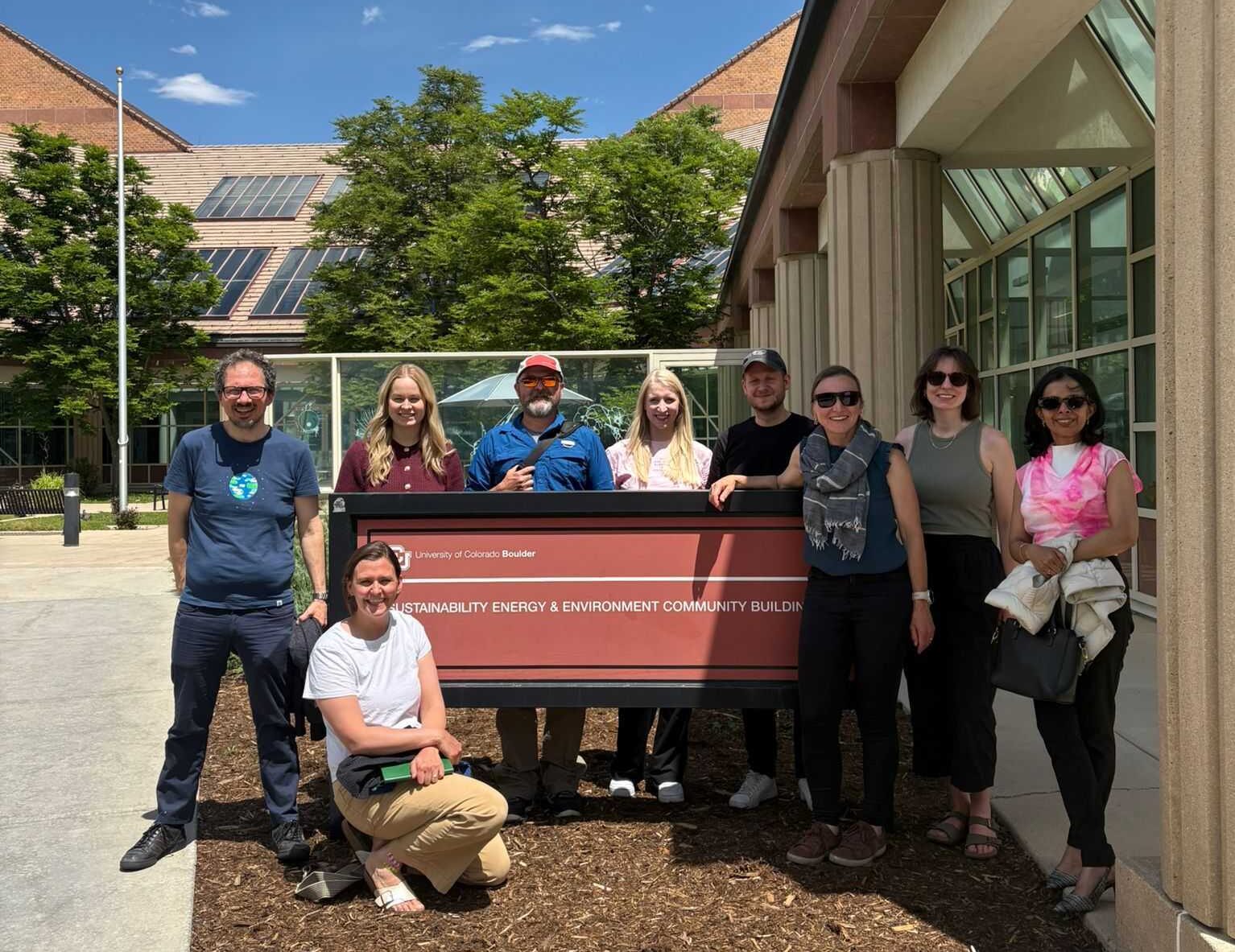
June 10, 2025 | Workshop Media & Climate Change in Boulder
Ahead of the ICA Annual Conference in Denver, a one-day workshop on Media & Climate Change took place at the University of Colorado Boulder. The event was jointly organized by the Munich Science Communication Lab (MSCL) at LMU, the Media and Climate Change Observatory at the University of Colorado Boulder, and Denison University’s Sustainability & Environmental Studies Program.
During the workshop, Simon Lübke presented the interdisciplinary research project KLIMA-MEMES, offering insights into several areas of the project’s work. Among other topics, his presentation focused on the role of internet memes in climate communication—exploring how visual humor, irony, and user-generated content shape public engagement with climate change across digital platforms.
The workshop brought together researchers from communication studies, environmental science, and media analysis to discuss current challenges and new approaches to climate communication. We’re grateful to have contributed to this vibrant exchange—and to share perspectives from the KLIMA-MEMES project on how digital culture intersects with the climate crisis.
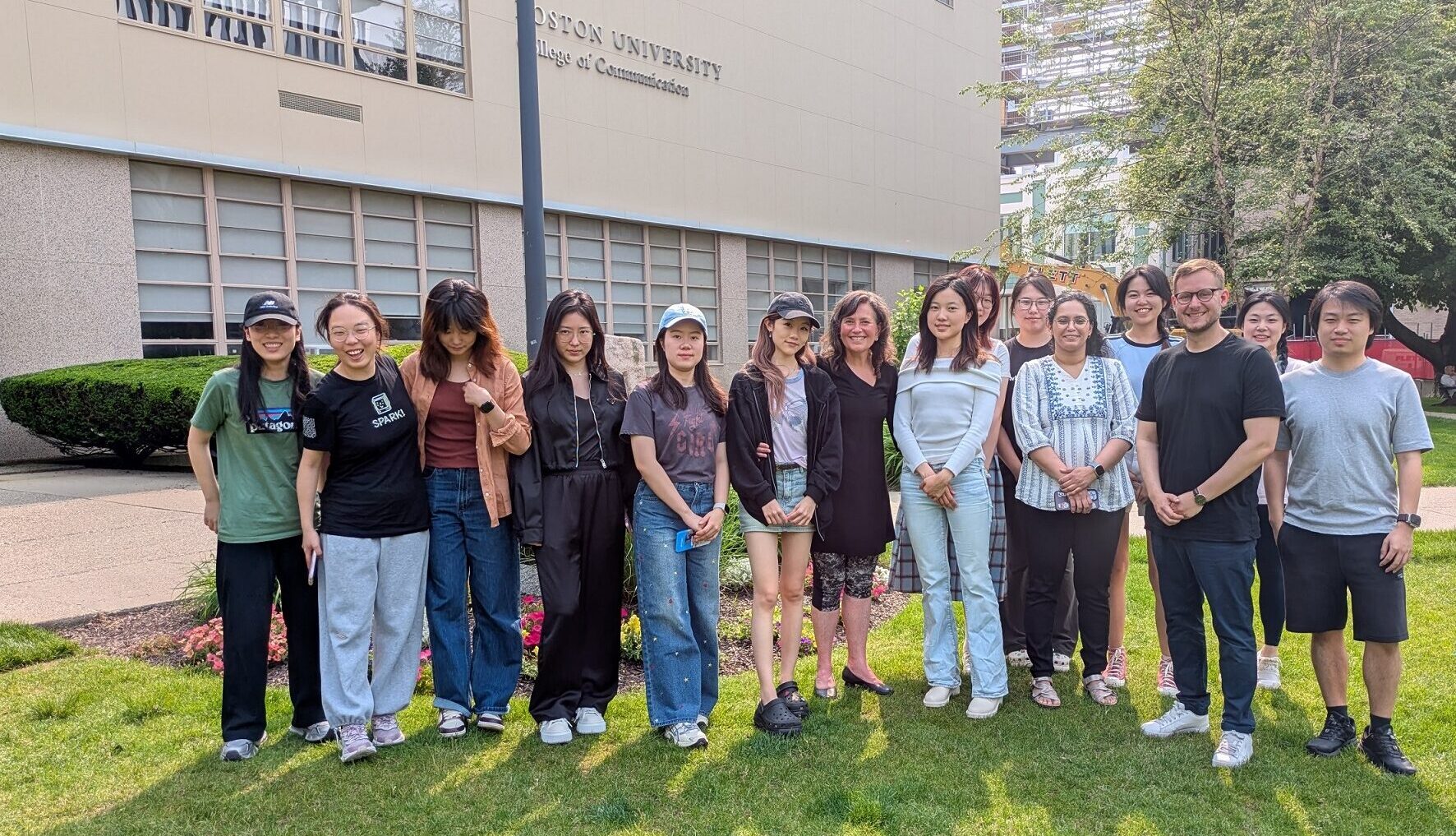
June 4, 2025 | Guest Lecture at BU College of Communication
During a research stay at Boston University, Simon Lübke was invited to present a talk at the College of Communication. Hosted by Prof. Betsi Grabe—who serves as an international expert on the KLIMA-MEMES project—Simon introduced the goals and methods of KLIMA-MEMES and shared our latest findings on climate change skepticism in Germany.
The session brought together students and doctoral researchers from the College of Communication to discuss how skepticism toward climate policy manifests in different national contexts. Participants compared our German data with trends they’ve observed elsewhere, enriching the conversation with global perspectives. In addition to the exchange about climate change communication, we held a mini–workshop on effective presentation techniques and the key expectations for academic talks. The interactive format allowed attendees to give feedback on delivery style and slide design, fostering a practical dialogue on scientific communication.
We send our sincere thanks to Prof. Grabe for her warm hospitality and to everyone who joined us for their insightful questions and constructive feedback.
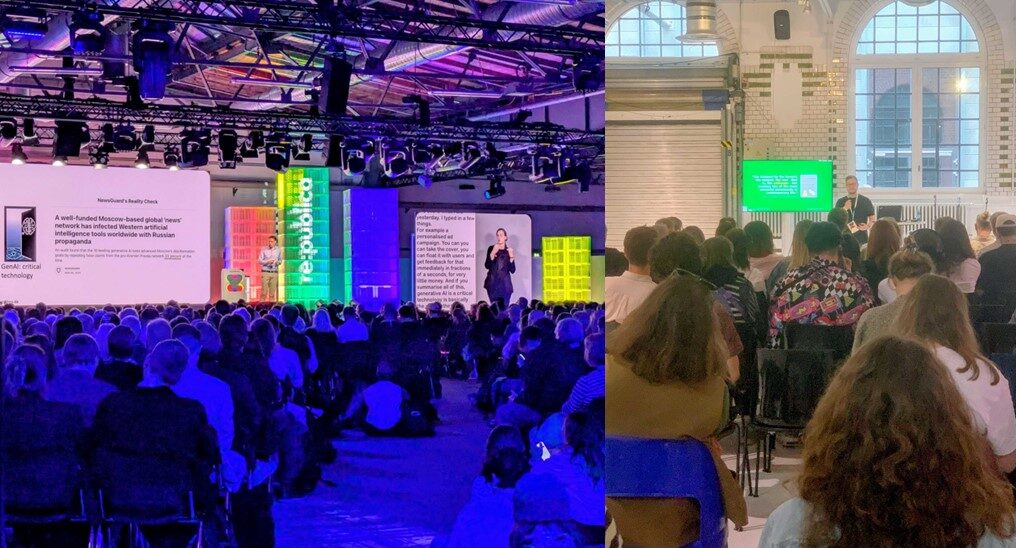
May 26 – 28 | Talks at re:publica 25
From May 26 to 28, 2025 our colleagues from the KLIMA-Memes project attended re:publica25, the festival of the digital society. Björn Ommer and Simon Lübke were both speakers at the conference. Björn Ommer had the honor of opening the event with his keynote speech, „Generative AI and the Future of Intelligence.“ On the conference’s largest stage, he discussed why AI is becoming a critical enabling technology and its implications for our society. He also explained why sovereignty in the AI age requires a new mindset. Simon Lübke gave a presentation at the event as well. In his talk, „Vote for Me, I’m Authentic!,“ he discussed the importance and impact of authenticity in politics and presented findings from his research. We thank the organizers for giving us the opportunity to present our work at the event.
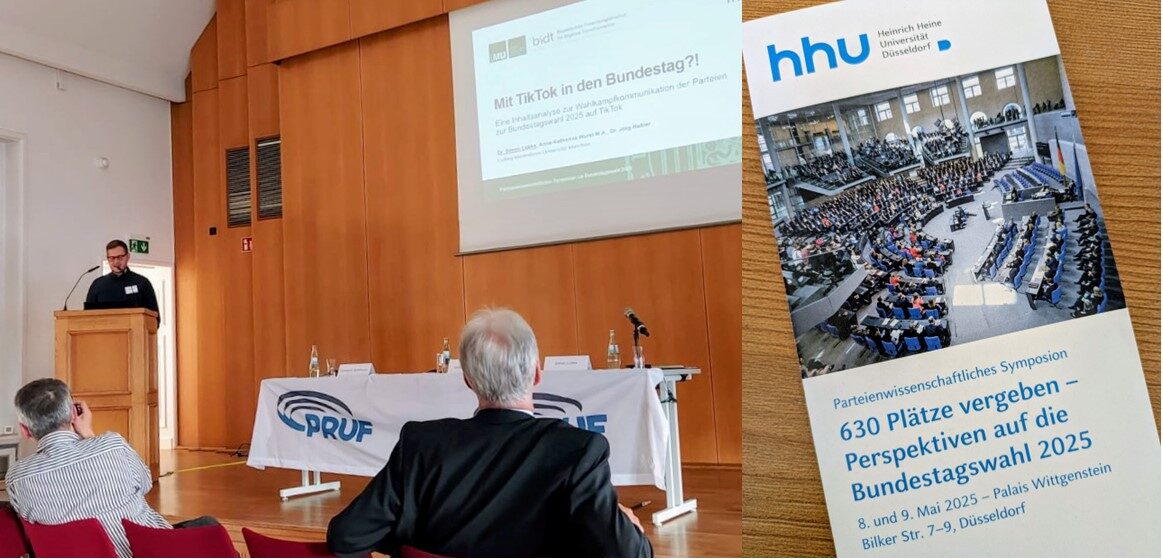
May 8, 2025 | PRUF Symposion 2025
Simon Lübke presented the results of an analysis of the 2025 federal election campaign on TikTok at the Institute for German and International Party Law and Party Research (PRUF) symposium. Entitled „Mit TikTok in den Bundestag?!“, the presentation was based on a content analysis of the parties‘ TikTok profiles during the final phase of the election campaign. This analysis was conducted with Anna-Katharina Wurst and Jörg Haßler. Initial results show that the Left Party and the Alternative for Germany (AfD) had the highest average number of likes and shares. Migration and the economy were also the most frequent topics on TikTok. Additionally, the analyses revealed that right-wing parties engage in negative campaigning more frequently than left-wing parties and that their content focuses heavily on individual politicians.
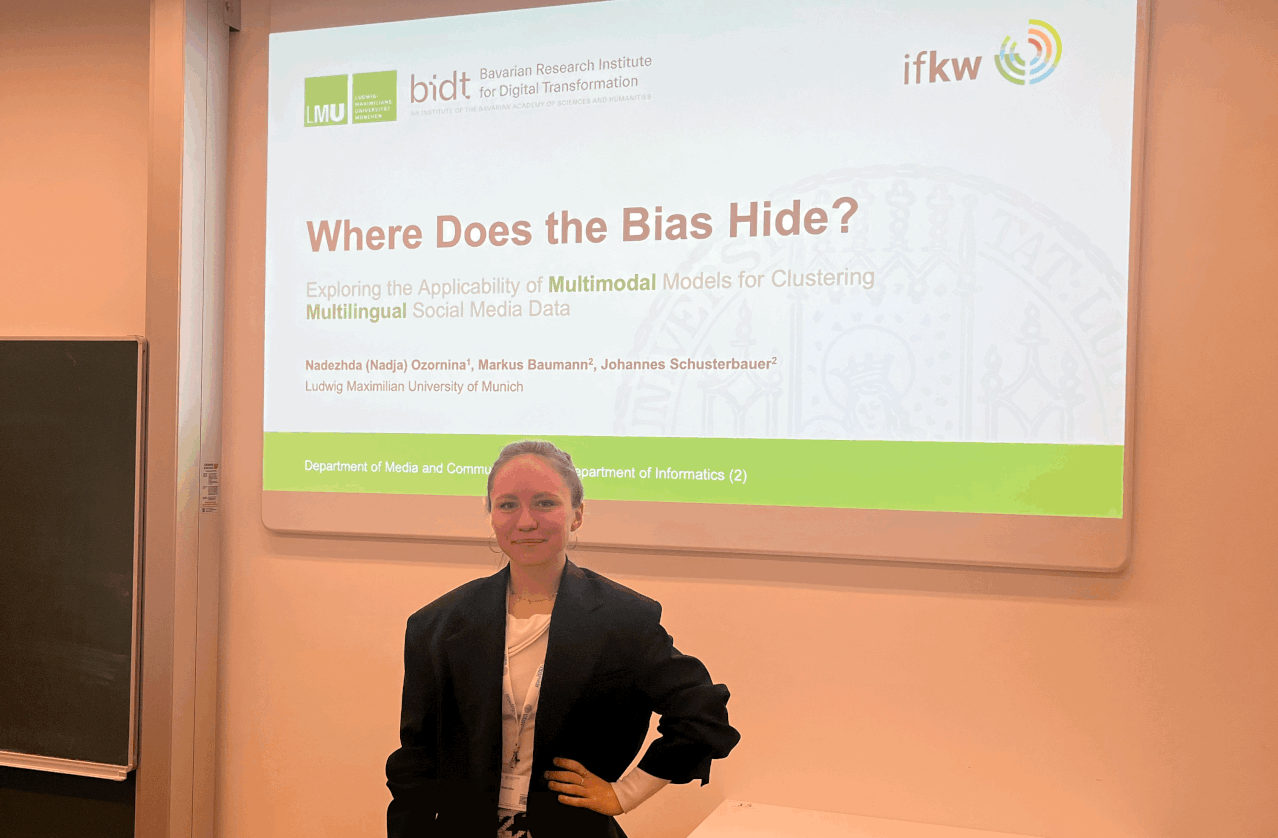
April 16, 2025 | COMPTEXT 2025 Conference
Nadezhda Ozornina, Markus Baumann, and Johannes Schusterbauer presented findings from the KLIMA-MEMES project at the COMPTEXT 2025 conference in Vienna. Their talk, titled “Where Does the Bias Hide? Exploring the Applicability of Multimodal Models for Clustering Multilingual Social Media Data,” was based on an interdisciplinary collaboration between communication scientists and computer vision researchers. It investigated how multimodal data, such as internet memes, could be clustered across languages. A challenge is that the content must be grouped by both language and content across languages. To accomplish this, the researchers used the Contrastive Language-Image Pretraining (CLIP) approach and compared different combinations of text input and their effects on clustering. Their results show that the model works best when fed AI-generated descriptions of content to find thematically coherent, cross-language clusters.
Abstract:
Where Does the Bias Hide? Exploring the Applicability of Multimodal Models for Clustering Multilingual Social Media Data.
The rise of multimodal content on social media underscores the need for automated text-image clustering in the social sciences (Peng et al., 2023). As global issues are discussed across multiple languages simultaneously, applying
multimodal models like CLIP beyond single-language contexts becomes important. However, using these models for multilingual tasks presents a challenge of language bias, remaining underexplored in text-image settings. This study examines
the applicability of multimodal models for multilingual social media data, focusing on language bias in text-image clustering. We apply the CLIP model to a multilingual dataset of 65,685 Instagram images with OCR-generated texts
collected during COP28. Building on prior research in multilingual analysis (e.g. Reber, 2019), we combine image embeddings with text embeddings from either (a) the original texts or (b) English translations by Google. The k-means
clustering results are then compared. The analysis reveals biases in the multimodal clustering approach using CLIP, particularly in its tendency to cluster data by language rather than content. Contrary to expectations, machine translation
only marginally mitigates these biases, which become more pronounced when images are weighted more heavily for classification. This suggests that biases are rooted not only in the textual but also in image features, particularly
in how the visual representation of texts differs across languages. We explore potential techniques for mitigating language bias, such as inpainting to neutralize text-based visual elements and vision-language models for generating
more language-agnostic textual descriptions of images. The findings highlight the potential and limitations of these approaches, offering new avenues for multimodal analysis.
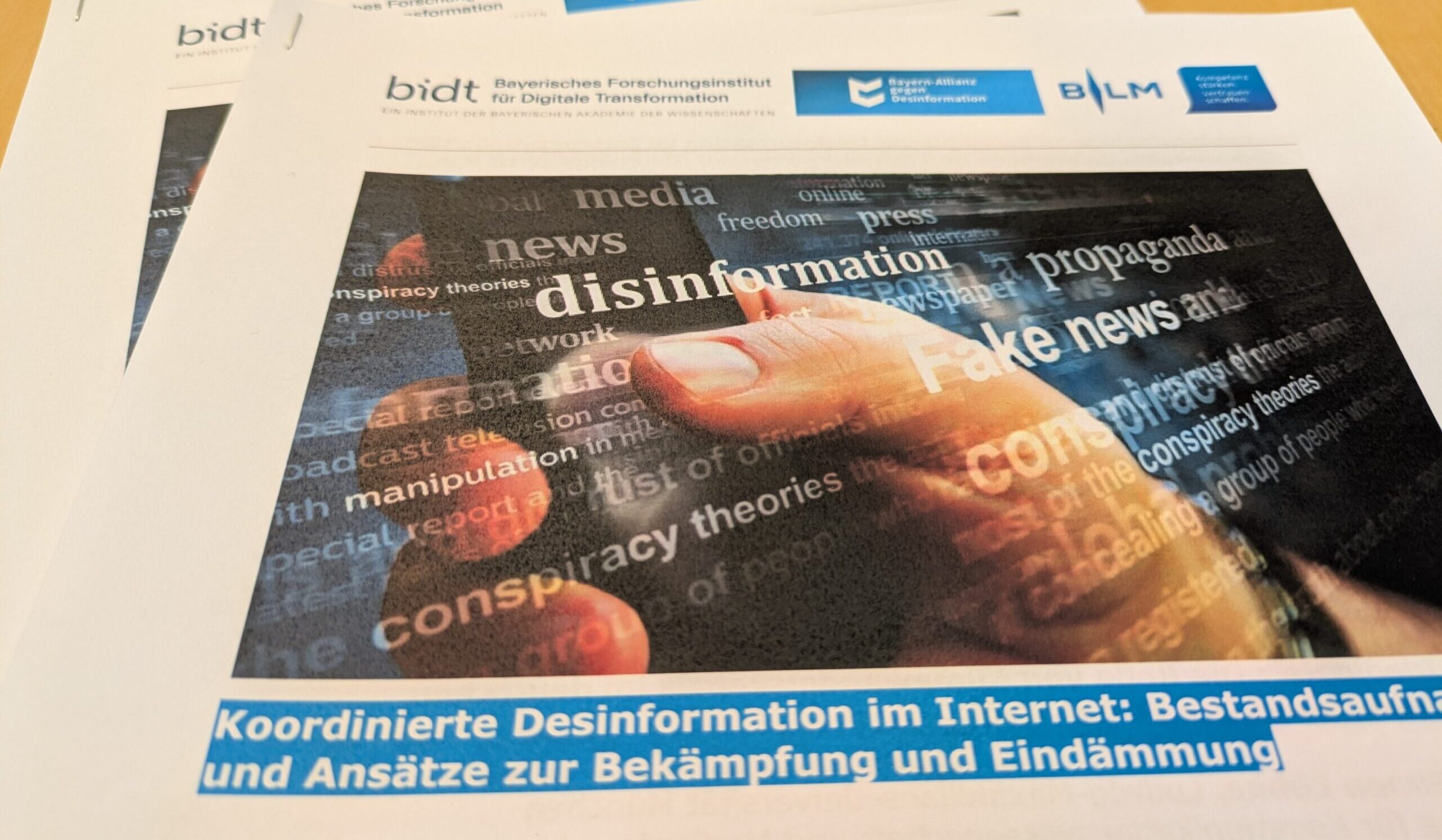
March 28, 2025 | Workshop on Coordinated Desinformation
Researchers from the KLIMA-MEMES project attended a workshop hosted by the bidt and the BLM on coordinated disinformation on March 28, 2025. At the event, experts from research, industry, politics, and civil society discussed findings on how to detect and combat disinformation on the internet.
Simon Lübke gave a short presentation on the topic “Countering ‚climate ideology‘: the role of climate change skepticism in the German climate change discourse on social media”. The talk presented findings on the proportion of climate change skepticism on platforms such as Facebook, YouTube, Instagram, and TikTok. The results show that climate change skepticism tends to play a lesser role in Germany than in other countries. In addition, the analyses show that institutional actors in the German discourse mainly use more subtle forms of skepticism that express doubts about the necessity of climate change measures.
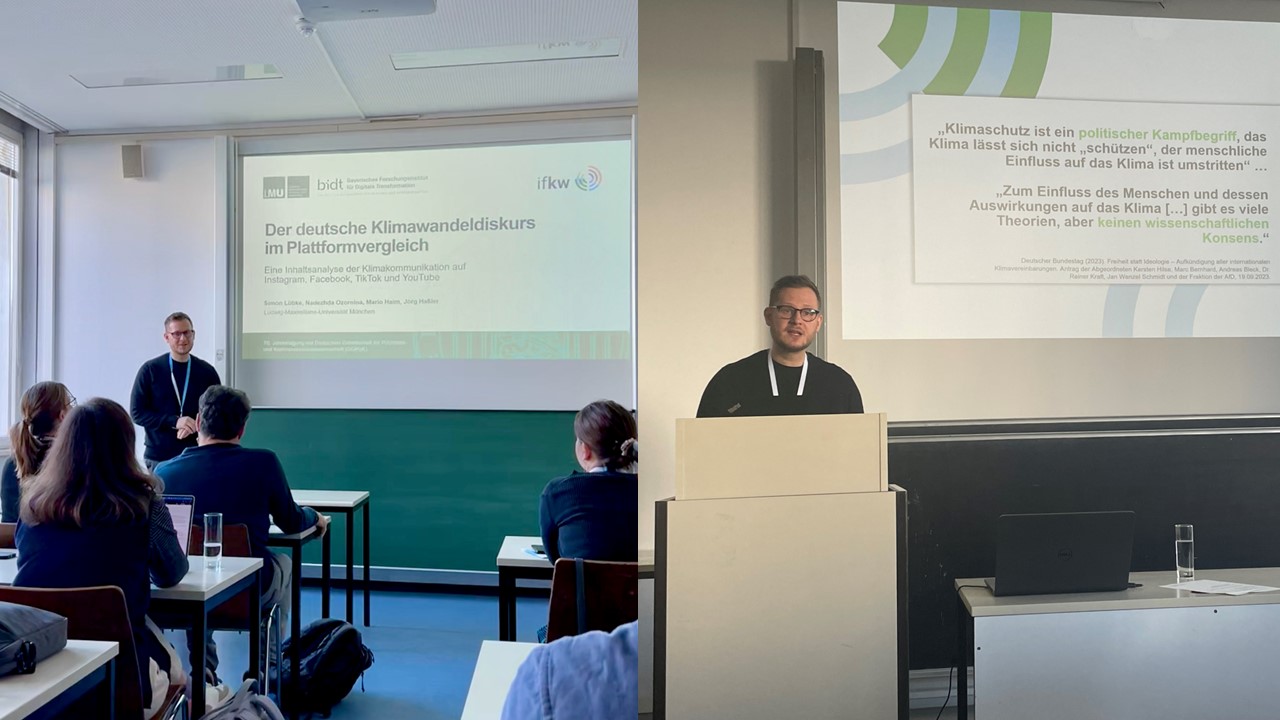
March 20, 2025 | KLIMA-MEMES Talks at DGPuK 2025 Conference
The 70th annual conference of the German Communication Association (DGPuK) took place from March 19 to 21 at the Free University of Berlin. The conference theme was „The Public and its Values“. The KLIMA-MEMES project had two talks at the conference. First, Simon Lübke presented a joint paper with Nadja Ozornina, Mario Haim and Jörg Haßler comparing climate change communication by politicians and journalistic media on different social media platforms. They conclude that the communication of political actors and the media differs in the focus and topics of climate change.
Second, the same team of authors presented a paper on the AfD’s climate communication in social media. The talk presented by Simon Lübke showed that climate change had a comparatively high priority in social media communication during the COP28 in Dubai and that the party shared climate change skeptical positions on social media.
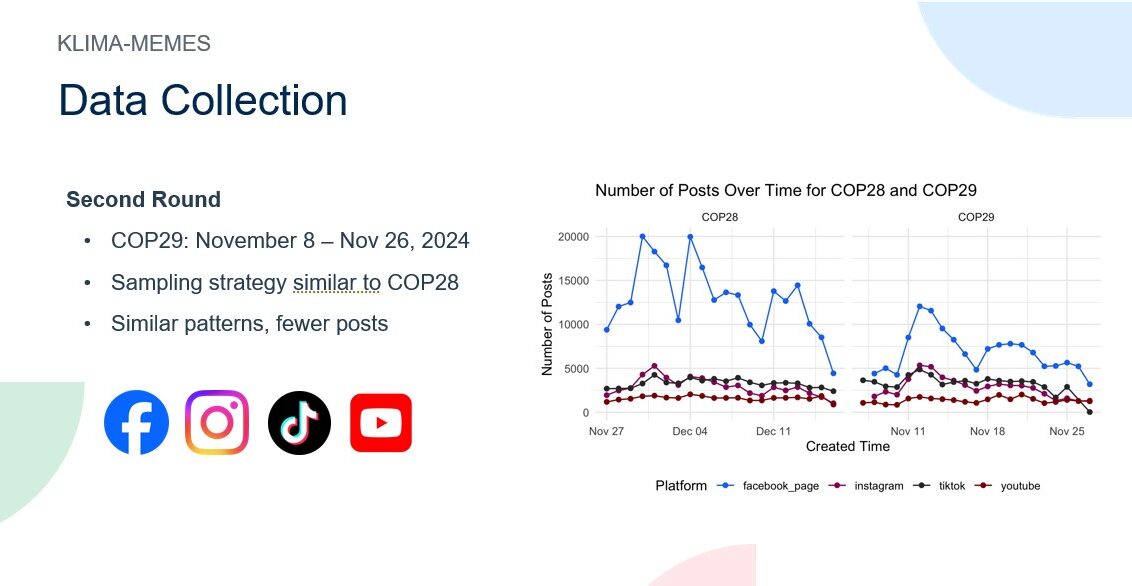
January 20, 2025 | COP29: Data collection completed
The KLIMA MEMES project analyzes visual social media content on climate change. As part of the project, we have once again collected data from different social media content to analyse communication on the topic and from different political actors. The context of the data collection was the UN Climate Change Conference 2024 in Baku, Azerbaijan (COP29). A similar sampling strategy was used last year to collect data on COP28 in Dubai. The UN climate conferences are global events where attention to climate change is particularly high, and the number of climate change stories reaches its highest level each year. This year’s event in Germany coincided with the collapse of the national government. Whether this had an impact on the prominence of the events in Baku and the discussions on climate change will be examined later in the project.
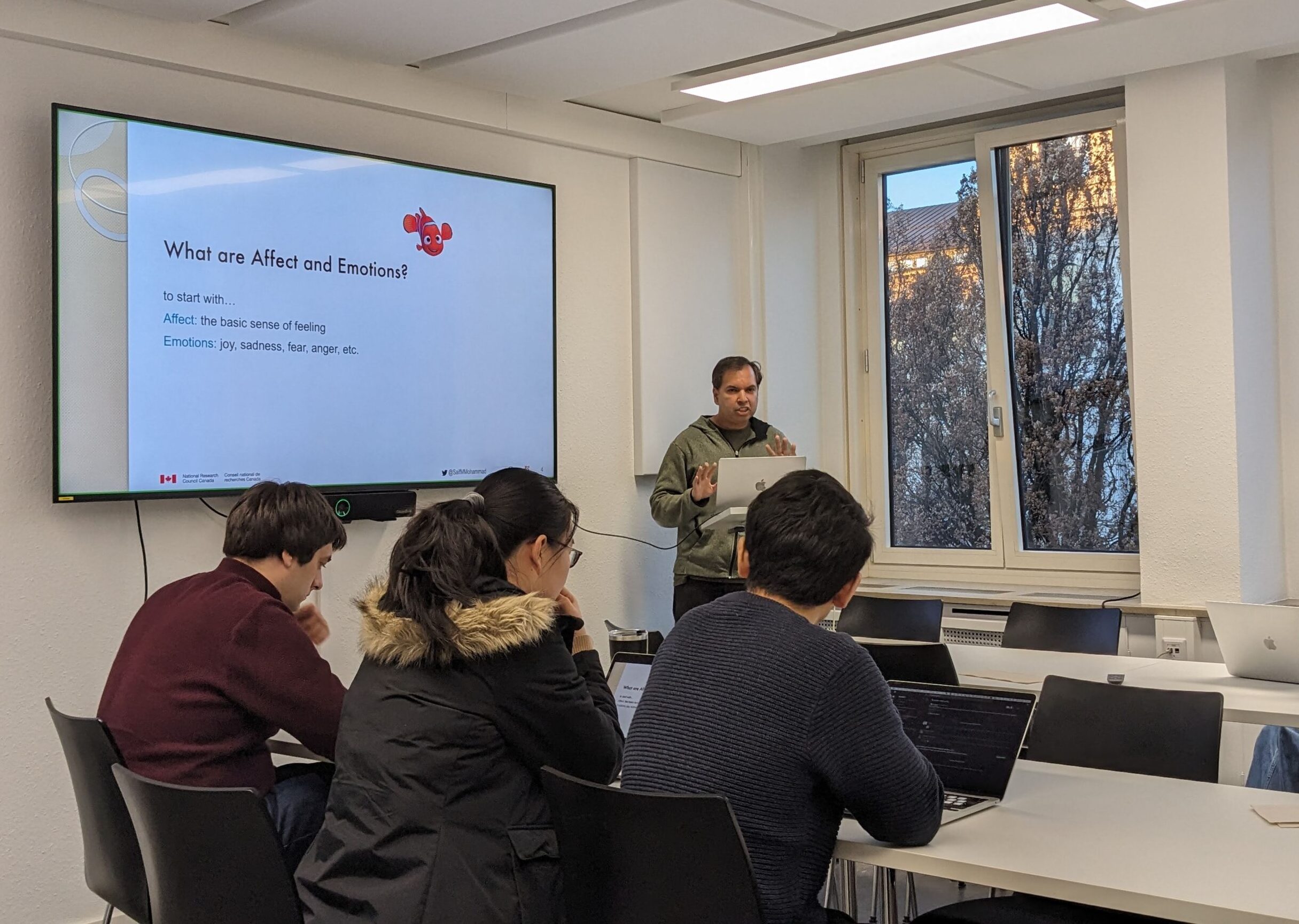
November 27, 2024 | Research talk by Saif Mohammad
On 27 November 2024, Dr Saif Mohammad from the National Research Council Canada and an international expert in the project gave a lecture entitled „NLP for Affective Science: A Window into Emotions through Language and Computation“ at the MaiNLP research lab at LMU. In his talk, Dr Mohammad discussed core theories of affect and emotion, word-emotion associations, and approaches for tracking emotional arcs.
We would like to thank Saif for his inspiring talk and for sharing valuable insights into his research.
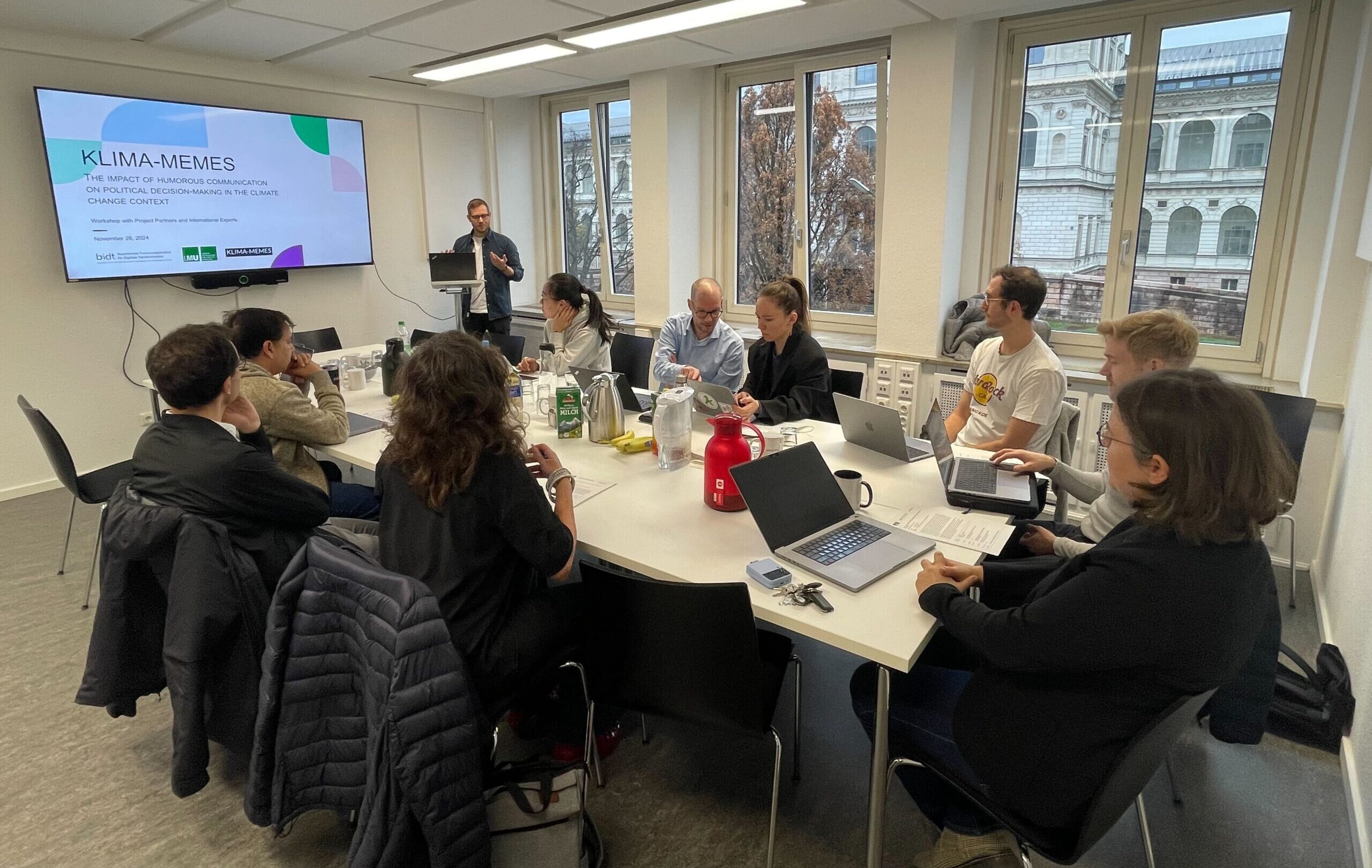
November 26, 2024 | Project workshop with international experts
On 26 November, we held our second project workshop in Munich, together with our international experts Betsi Grabe (Boston University) and Saif Mohammad (NRC Canada). The meeting, which brought together all working groups, focused on the exchange and evaluation of (inter)disciplinary analyses of climate change communication on social media.
In the first part of the workshop, the working groups presented their approaches and results so far, as well as their goals for the next phase of the project. The second part of the workshop focused on assessing the interdisciplinary collaboration within the project so far and exploring further opportunities for cross-group collaboration.
We would like to thank all participants of the workshop and especially Betsi Grabe and Saif Mohammad for their valuable input.
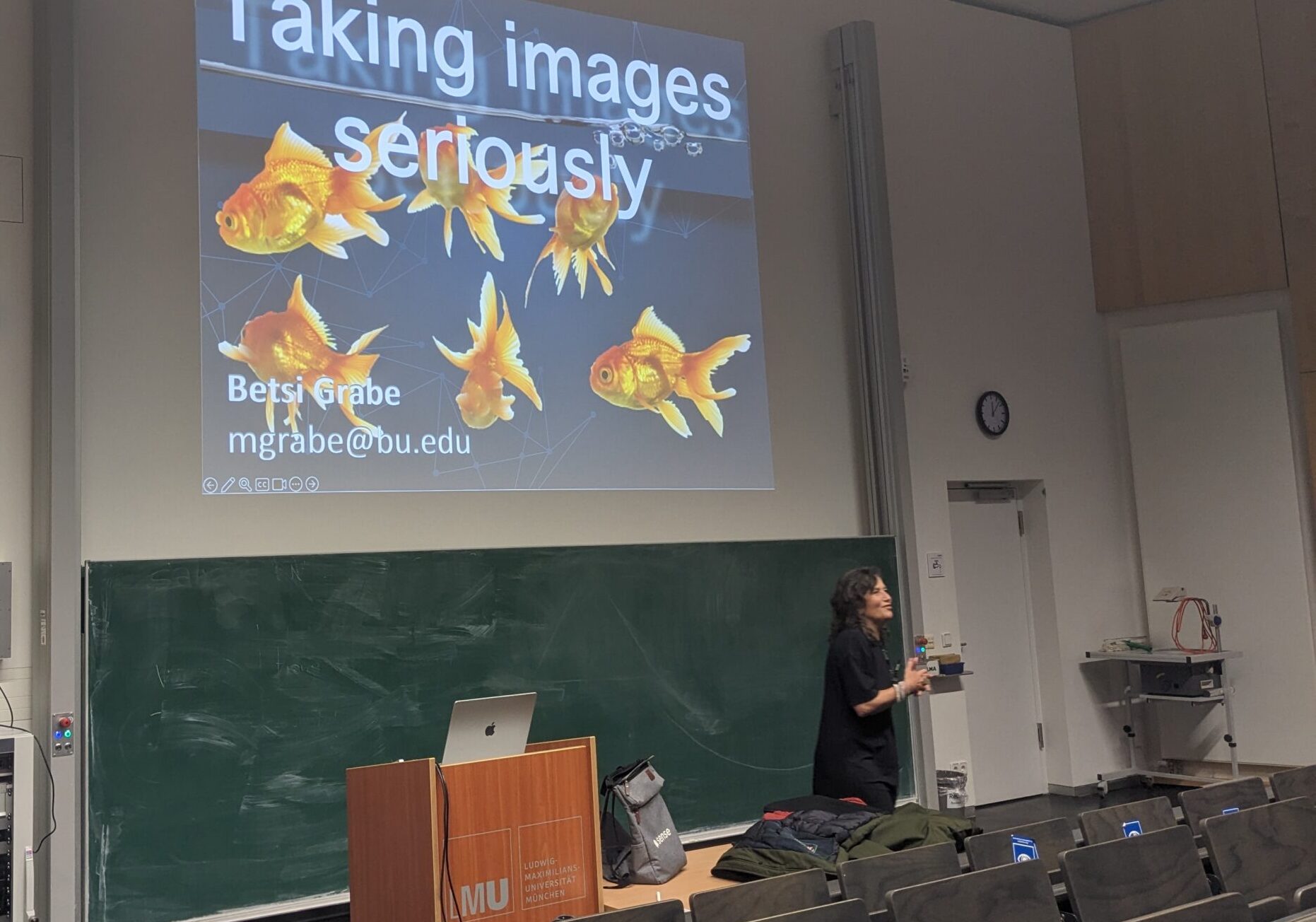
November 26, 2024 | Lecture by Betsi Grabe
On 26 November, Prof. Betsi Grabe from Boston University and an international expert on the project gave a lecture on „Taking Images Seriously“ at the LMU. The lecture was part of the Political Communication course taught by Jörg Haßler at the Department of Media and Communication. In her talk, Betsi Grabe provided insights into the dynamics of US election campaigns over the past 20 years, focusing in particular on patterns in the visual self-representation of the leading candidates.
We thank Betsi for providing insights into her research agenda and the inspiring talk.

November 15, 2024 | Memes on collapse of Germany’s Government
On November 6, the governing coalition in Germany, consisting of the SPD, the Greens, and the FDP, collapsed after Chancellor Olaf Scholz initiated the dismissal of Finance Minister Christian Lindner, causing the FDP to withdraw from the government. Following these events, numerous memes about the situation appeared on various social media platforms. In subsequent media interviews, researchers from our KLIMA-MEMES project provided scientific insights into the motives behind the creation of memes, their content and their impact.
The individual articles with Bayerischer Rundfunk (BR), Westdeutscher Rundfunk (WDR) und Norddeutscher Rundfunk (NDR) can be accessed via the links below:
Ruppert, J. (2024). Ampel vs. Ampel vs. Union: Nur noch Streit in der Politik? Bayerischer Rundfunk, 15.11.2024.
Sonntag, S. & Wilczynski-Bartels, M. (2024). Ampel-Memes: Humor in Krisenzeiten. WDR5 Töne, Texte, Bilder, 09.11.2024.
Schwyzer, A. (2024). Mit Humor durch die Krise: Die politische Lage in Memes. NDR Kultur, 07.11.2024.

October 11, 2024 | LMU Climate School
As in the previous year, the KLIMA-MEMES project was once again part of the LMU Climate School in 2024. At the interdisciplinary event on October 11, Simon Lübke led a workshop on news media and climate change. In the workshop, participants discussed the basics of journalistic reporting on climate change. They learned how to recognize and identify reporting patterns in climate change reporting. The workshop also provided insights into current trends in the climate debate were discussed, including constructive journalism and the role of internet memes and humor.

October 3, 2024 | ECCV 2024
Johannes Schusterbauer and Björn Ommer took part in the 8th European Conference on Computer Vision ECCV 2024 in Milan from September 29 to October 4. Among other things, they presented the project paper entitled “FMBoost: Boosting Latent Diffusion with Flow Matching” and were selected for an oral presentation. In this paper, they present a method that can be used to achieve complex image processing models with less computational effort.
Abstract: Visual synthesis has recently seen significant leaps in performance, inparticular due to breakthroughs in generative models. Diffusion models have been a key enabler as they excel in image diversity. This, however, comes at the prize of slow training and synthesis which are only partially alleviated by latent diffusion. To this end, flow matching is an appealing approach due to its complementary characteristics of faster training and inference but less diverse synthesis. We demonstrate that introducing flow matching between a frozen diffusion model and convolutional decoder enables high-resolution image synthesis at reduced computational cost and model size. A small diffusion model can then provide the necessary visual diversity effectively, while flow matching efficiently enhances resolution and details by mapping the small to a high-dimensional latent space. These latents are then projected to high-resolution images by the subsequent convolutional decoder of the diffusion approach. Combining the diversity of diffusion models, the efficiency of flow matching, and the effectiveness of convolutional decoders, achieves state-of-the-art high-resolution image synthesis at 1024 2 pixels with minimal computational cost. Cascading our model optionally boosts this further to 2048 2 pixels. Importantly, our approach is orthogonal to recent approximation and speed-up strategies for the underlying model, making it easily integrable into the various diffusion model frameworks.
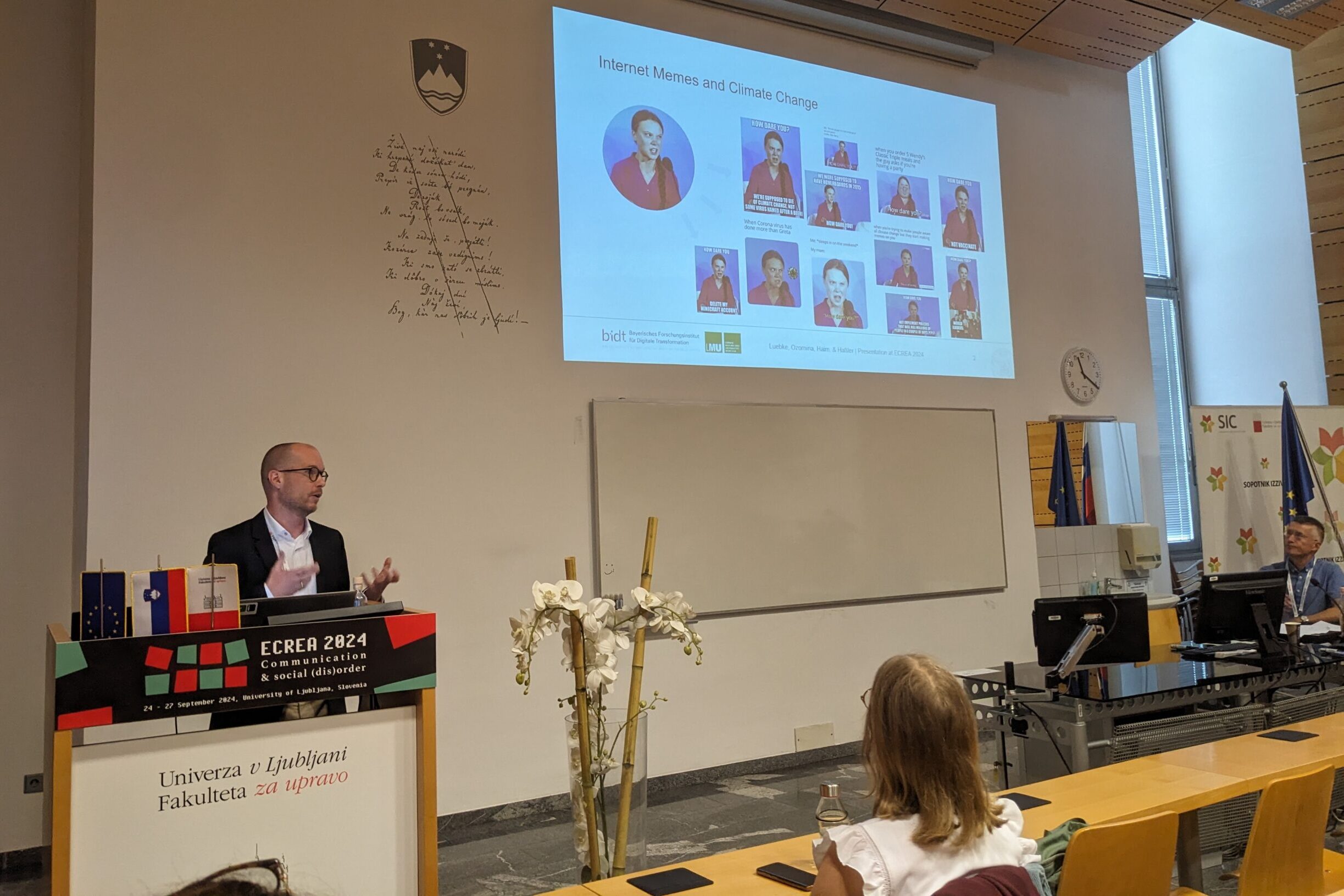
September 25, 2024 | ECREA 2024 Conference
Jörg Haßler and Simon Lübke attended the 10th ECREA European Communication Conference in Ljubljana last week, from September 24 to 27. During the conference, Jörg Haßler presented their joint work with Simon Lübke, Nadezdha Ozornina, and Mario Haim titled „The use of humor styles in memes on climate change“ in the panel „Public understandings of climate change.“ The presentation discussed various humor styles used in internet memes and shared findings from our project’s analyses on the use of humor in content related to COP28.
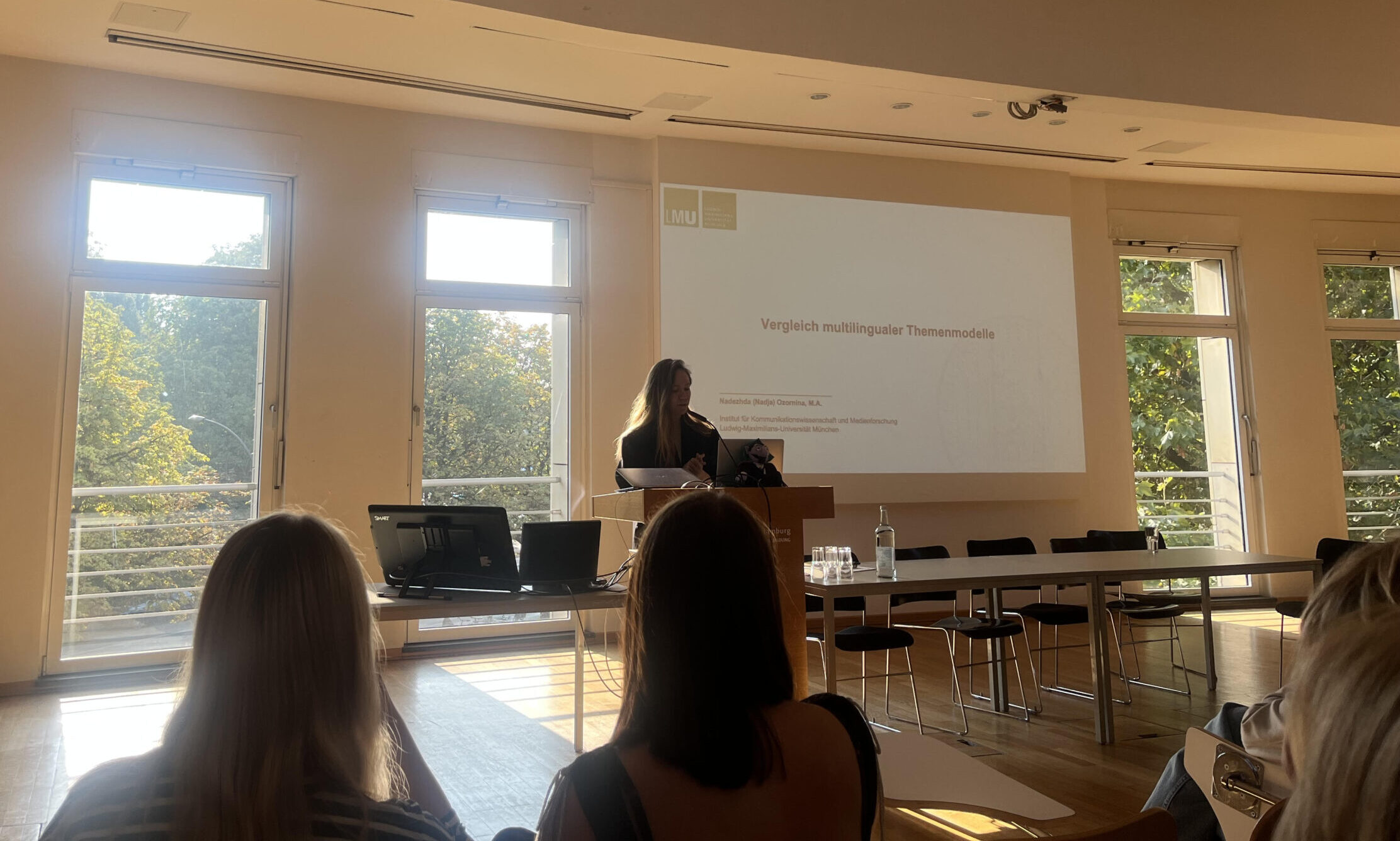
September 20, 2024 | forsa / Paul Lazarsfeld Scholarship for Nadezdha Ozornina
Nadezdha Ozornina has been awarded the forsa / Paul Lazarsfeld Scholarship 2024 by the Methods Division of the German Communication Association (DGPuK). Our colleague from the KLIMA-MEMES project was honored with this award for her work „Comparing Multilingual Topic Models“ at the joint annual conference of the Methods and Digital Communication Divisions of the DGPuK in Hamburg. The Paul Lazarsfeld Scholarship recognizes outstanding students or graduates in journalism and communication studies for particularly demanding or innovative research and final theses in the field of methods. The entire project team congratulates Nadezdha on this achievement.

September 19, 2024 | Interview with Jörg Haßler on the political communication by German parties on TikTok
The political communication of the Alternative für Deutschland (AfD) on social media is often cited as one of the reasons for the party’s recent electoral successes. Specifically, the party’s content on TikTok is highlighted to explain the high voter turnout among younger demographics. In an interview with Deutschlandfunk, the project leader of KLIMA-MEMES, Jörg Haßler, analyzes the AfD’s communication strategy on TikTok. He points to the heightened emotionalization of AfD content as a key factor explaining the higher average reach of AfD posts compared to those of other parties. These and other insights from Jörg Haßler can be found in the interview titled “ „Soziale Medien – Wie demokratische Parteien auf TikTok nachziehen“ by Tobias Krone.

September 19, 2024 | Conference of the DGPuK Methods Division
Nadja Ozornina took part in the joint annual conference of the DGPuK Methods and Digital Communication Divisions in Hamburg from September 18 to 20. As part of the conference, she presented a joint paper with Simon Lübke and Mario Haim and entitled “More than the sum of its parts: Challenges and approaches of automated analysis of multimodal social media content”. The paper deals with the analysis of multimodal social media content, i.e. content that combines multiple modalities such as text and image to construct meaning. The presentation discussed the methodological challenges that exist when analyzing multimodal content and presented various approaches to solving them.
Abstract: In the context of datafication, social media posts are an important source for automated analyses in communication science. Multimodal content, which combines different modalities such as text, images and sound, is playing an increasingly important role. However, analyzing this content poses methodological challenges for researchers, as images and texts have to be processed differently and it is often unclear how the information from the different modalities can be linked. Current research methods in communication science are mostly unimodal, while an overview of existing multimodal approaches and their characteristics is lacking. The article identifies three different groups of approaches for analyzing multimodal content, which differ in terms of the number of concepts examined and the respective intermediate analytical steps. Various application examples for the three approaches are presented and the advantages and disadvantages of the individual methods for different questions are discussed.

September 16, 2024 | Interview on pro-Russian cartoons and memes
In an investigative report by NDR, WDR and Süddeutsche Zeitung, internal documents from the Moscow-based Social Design Agency (SDA) were analyzed, providing insight into Russian disinformation campaigns in Germany. The documents show that Germany is one of the Kremlin’s preferred targets for spreading disinformation. In this context, the SDA disseminates numerous cartoons and internet memes on social media that specifically convey fake news and pro-Russian narratives. Our colleague from the KLIMA-MEMES project, Simon Lübke, analyzed some of the cartoons from the data leak for the Süddeutsche Zeitung. He also provides a short assessment of the conditions under which this content can be effective.
The article with the research results and Lübke’s statements can be accessed via the following link.
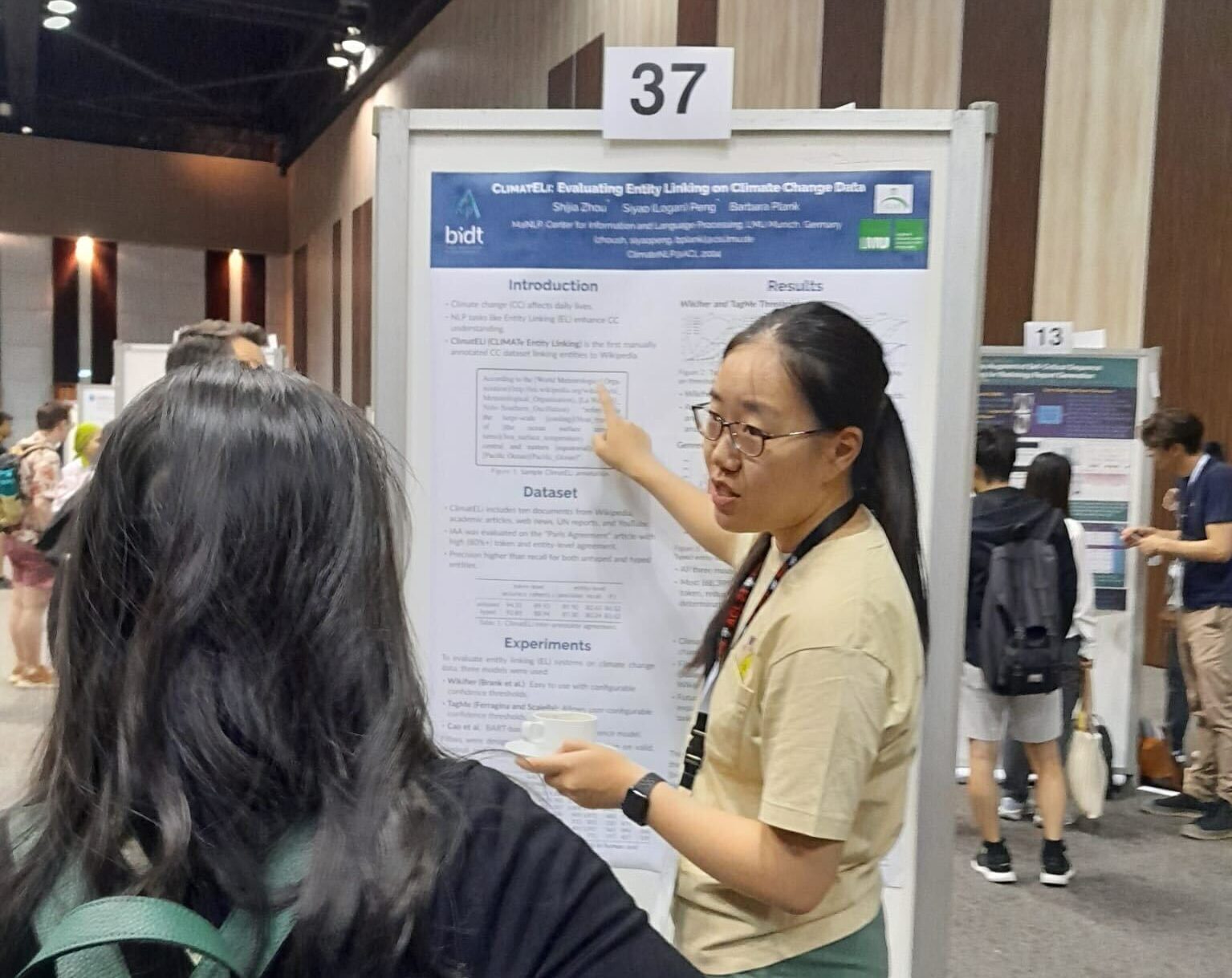
August 16, 2024 | ACL 2024 Conference
Shijia Zhou, Siyao Peng, and Barbara Plank from the KLIMA-MEMES Project attended the 62nd Annual Meeting of the Association for Computational Lunguistics (ACL 2024) from August 11-16 in Bangkok to present results from several research projects. Among them was a project presentation entitled “CLIMATELI: Evaluating Entity Linking on Climate Change Data” in which they use the entity linking approach to understand who and what is mentioned in different climate change text content.
Abstract: Climate Change (CC) is a pressing topic of global importance, attracting increasing attention across research fields, from social sciences to Natural Language Processing (NLP). CC is also discussed in various settings and communication platforms, from academic publications to social media forums. Understanding who and what is mentioned in such data is a first critical step to gaining new insights into CC. We present CLIMATELI (CLIMATe Entity LInking), the first manually annotated CC dataset that links 3,087 entity spans to Wikipedia. Using CLIMATELI (CLIMATe Entity LInking), we evaluate existing entity linking (EL) systems on the CC topic across various genres and propose automated filtering methods for CC entities. We find that the performance of EL models notably lags behind humans at both token and entity levels. Testing within the scope of retaining or excluding non-nominal and/or non-CC entities particularly impacts the models‘ performances.
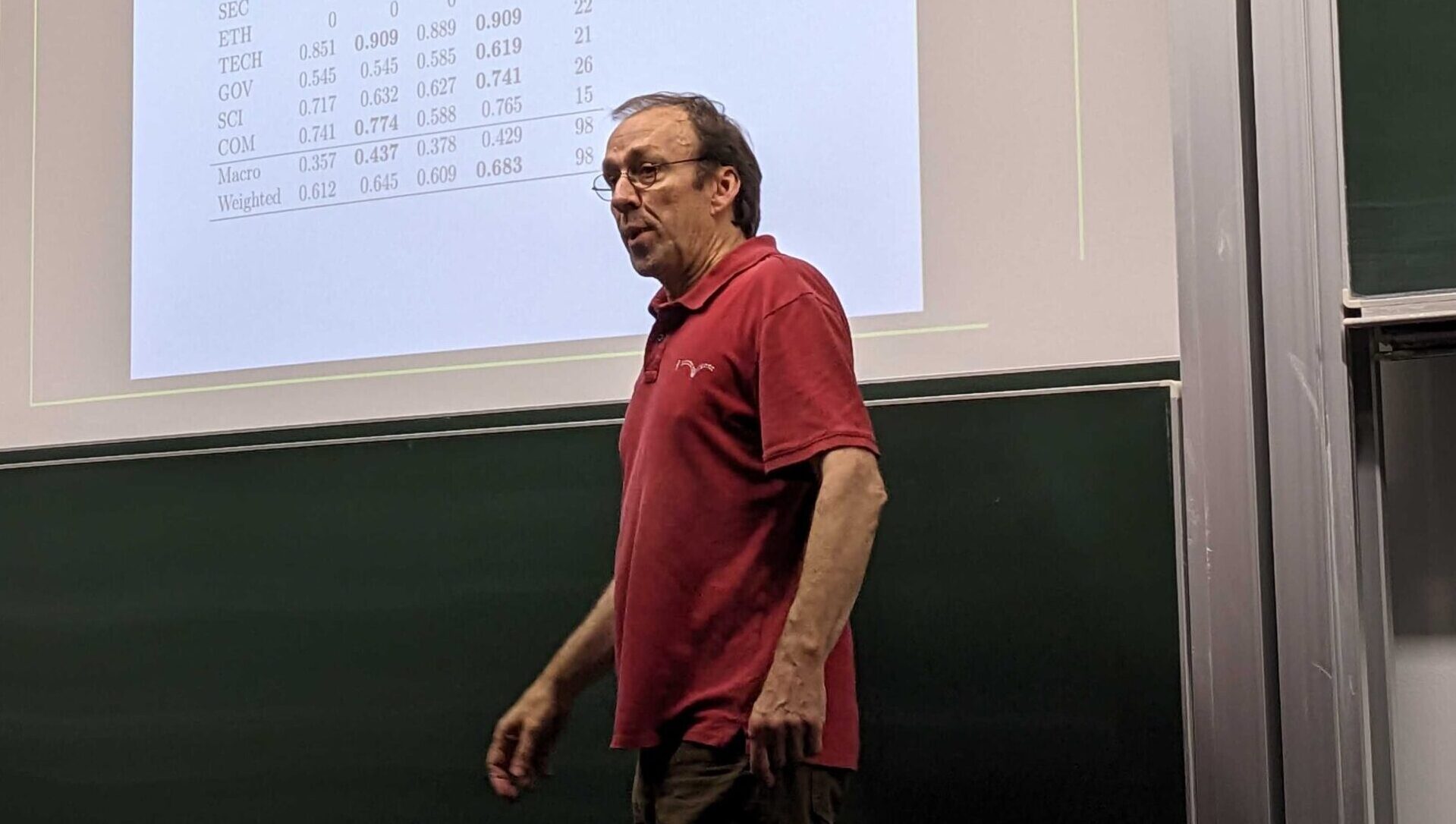
June 25, 2024 |Talk by Manfred Stede
Prof. Manfred Stede, Professor of Applied Computational Linguistics at the University of Potsdam, visited Barbara Plank’s MaiNLP research lab last week. During his visit, he gave a talk on the current projects of his research group titled „NLP on Climate Change Discourse: Two Case Studies.“ The talk focused on two main topics: the framing of climate change in journal editorials and the analysis of communication by members of the German Bundestag.
Abstract: The debate around climate change (CC) — its extent, its causes, and the necessary responses — is intense and of global importance. The ongoing discourses are a prominent object of study in several Social Sciences, while in the natural language processing community, this domain has so far received relatively little attention. In my talk, I first give a brief overview of types of approaches and data, and then report on two case studies that we are currently conducting in my research group. The first tackles the notion of „framing“ (the perspective taken in viewing an issue) in CC-related editorials of the journals ‚Nature‘ and ‚Science‘: We proceed from a coarse-grained text-level labeling to increasingly detailed clause-level annotation of framing CC, and run experiments on automatic classification. The second involves a corpus of parliamentary speeches, press releases and tweets from the members of the German parliament (2017-2021) and compares their ways of addressing CC, contrasting on the one hand the different communication channels and on the other hand the party affiliations of the speakers.
Bio: I’m a professor of applied computational linguistics at Potsdam University. My research and teaching activities revolve around issues in discourse structure and automatic text understanding, currently often for research questions from the social sciences.

June 21, 2024 | Blog entry on the use of humor in the climate crises
During re:publica 24, the KLIMA-MEMES team presented initial results from the research project. Simon Lübke has now also summarized these results and the contents of the presentation in a blog post for the Bavarian Research Institute
for Digital Transformation (bid). The blog post, titled „The Role of Humor in the Climate Crisis,“ discusses the function and impact of memes and humorous content in political communication. Additionally, the first findings of the
manual content analysis of the COP28 data conducted by the research team are presented and contextualized. Please find the link to the post below.
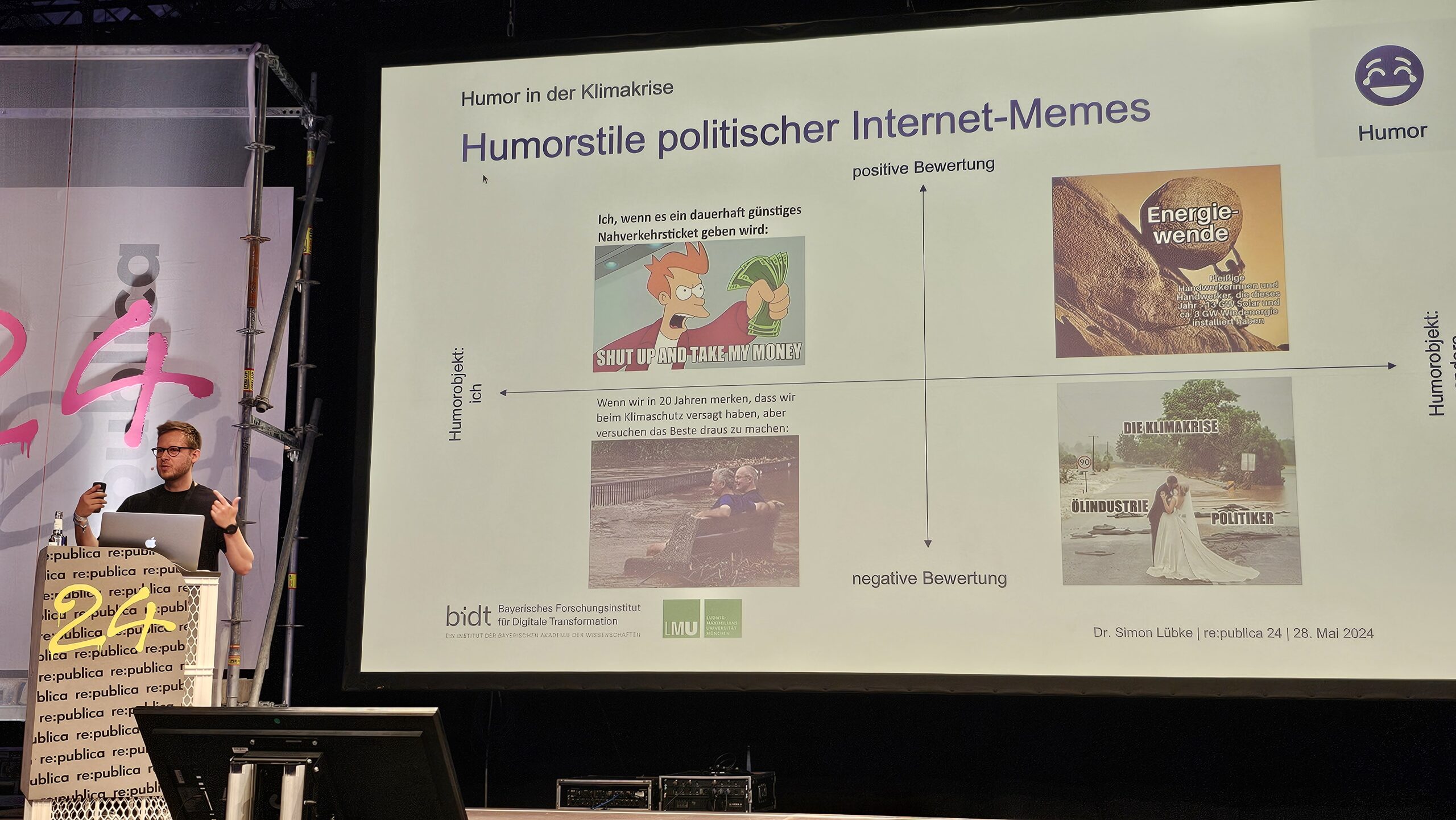
May 28, 2024 | re:publica24
From May 27-29, 2024, Simon Lübke participated in re:publica24 as a speaker. As part of the festival for the digital society, he gave a talk titled “Humor in the Climate Crisis: How Memes Influence the Political Climate Discourse.” In this presentation, he shared insights and first findings from the Climate Memes Project. These included preliminary results from a manual content analysis on the use of humor and memes during the 2023 UN Climate Change Conference (COP28) in Dubai.
Abstract: Memes are considered an effective strategic format in political discourses. However, it is still unclear what role they play in the climate change debate and which actors are actively involved. With the KLIMA-MEMES project, we investigate the use of climate change memes on social media, focusing on which memes are particularly popular and why. Recently, we analyzed about 900,000 social media posts on Instagram, Facebook, TikTok, and YouTube during the 2023 UN Climate Change Conference #COP28 in Dubai. Our initial findings show that memes achieve significant reach, especially when they use negative humor. However, relevant political actors such as protest groups and politicians have so far rarely used humorous content and memes. Thus, they miss the opportunity to counter popular and aggressive climate crisis memes with positive, humorous content.

May 3, 2024 | COMPTEXT Conference
On 2-4 May 2024, Nadezhda Ozornina participated in ‚The Sixth International and Interdisciplinary Conference on the Quantitative and Computational Analysis of Textual Data (COMPTEXT)‘ in Amsterdam, the Netherlands. She presented her study on the application of machine translation for multilingual topic modeling which investigates how robust the results of automated text analysis are depending on translation in different languages. The implications of the study provide a basis for analyzing data on climate change from social media and serve as recommendations for future studies. Additionally, there were meetings with other multimodal researchers that offered opportunities for interdisciplinary collaboration.
Abstract: For the consolidation of multilingual texts for topic modeling, machine translation is one of the most prominent approaches. However, when applying machine translation, the impacts of target language choice on the outcomes of topic modeling remain unclear. This study tests these impacts via two strategies: (a) consolidating texts into one of the documents’ original languages and (b) translating texts into an intermediary language not present in the initial data. To compare possible outcomes, a corpus of parallel texts from the United Nations written in Russian and German (N = 3760) is examined. The entire dataset is consolidated into one of the original languages by translating Russian texts into German, followed by the application of structural topic modeling algorithms. The results are then compared with outcomes derived from topic modeling after translating the same data into an intermediary language (English). For each translation approach, the similarity between parallel text collections is measured using topical prevalence and topical content metrics. The findings indicate that using an intermediary language for machine translation leads to a more symmetrical distribution of topics and a higher percentage of overlapping top words compared to consolidating the texts into one of the original languages. However, translating into an intermediary language significantly reduces the vocabulary as compared to retaining some texts in their original language. The findings are validated on different numbers of topics. Based on the results, the implications of using different target languages for machine translation are discussed and recommendations for future studies are developed.
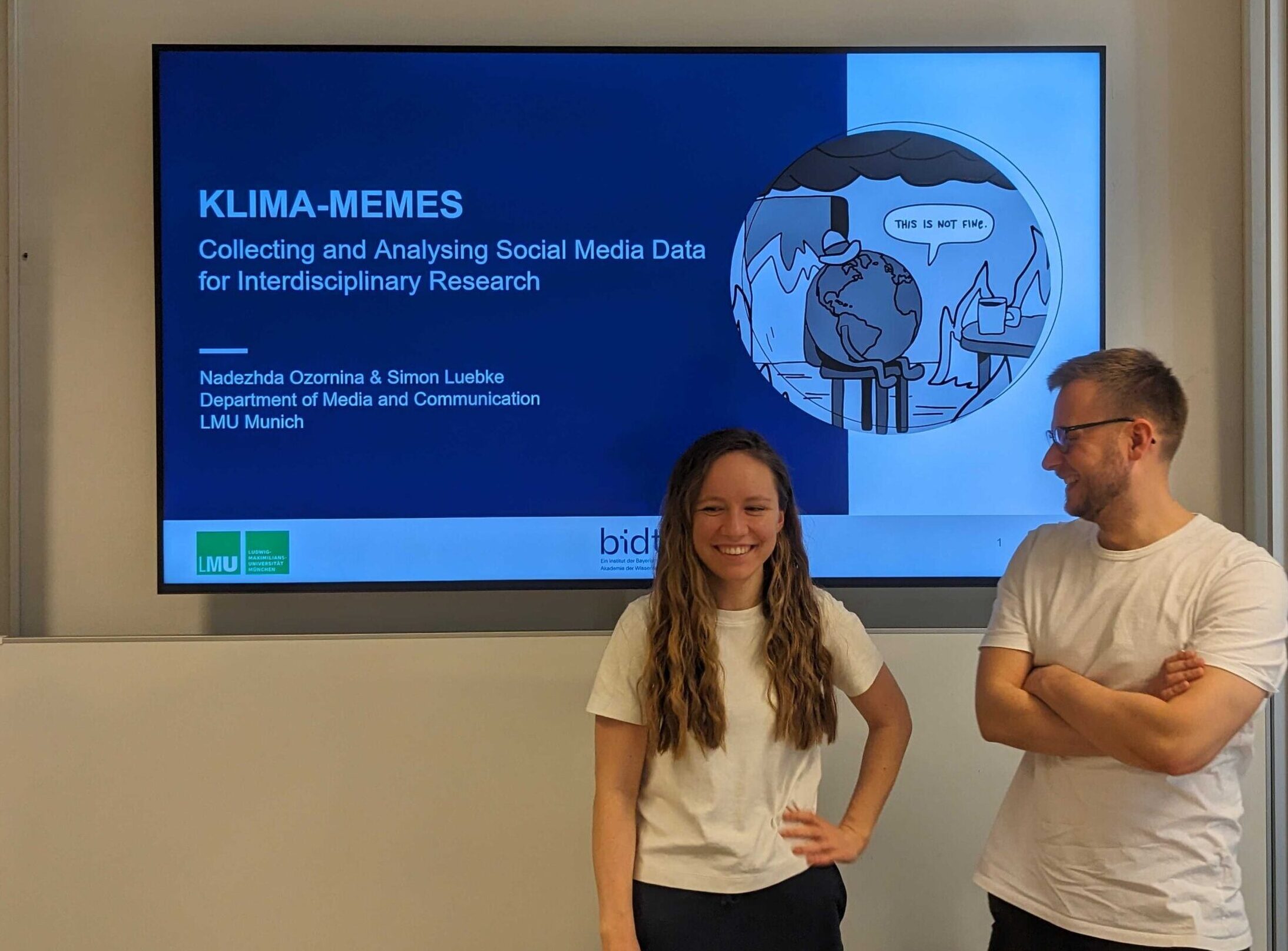
April 30, 2024 | Collecting and Analyzing Social Media Data
Nadja Ozornina and Simon Lübke presented recent findings from the Climate Memes project during a seminar held by the MaiNLP research lab at LMU. The seminar, led by KLIMA-MEMES team member Siyao (Logan) Peng, focused on Natural Language Processing (NLP) for Climate Change. The main focus of the talk titled „Collecting and Analyzing Social Media Data for Interdisciplinary Research” was on various approaches to collecting social media data from different platforms. Additionally, the two researchers engaged with the course participants in discussions about the project’s findings on COP28 and explored various analysis strategies.
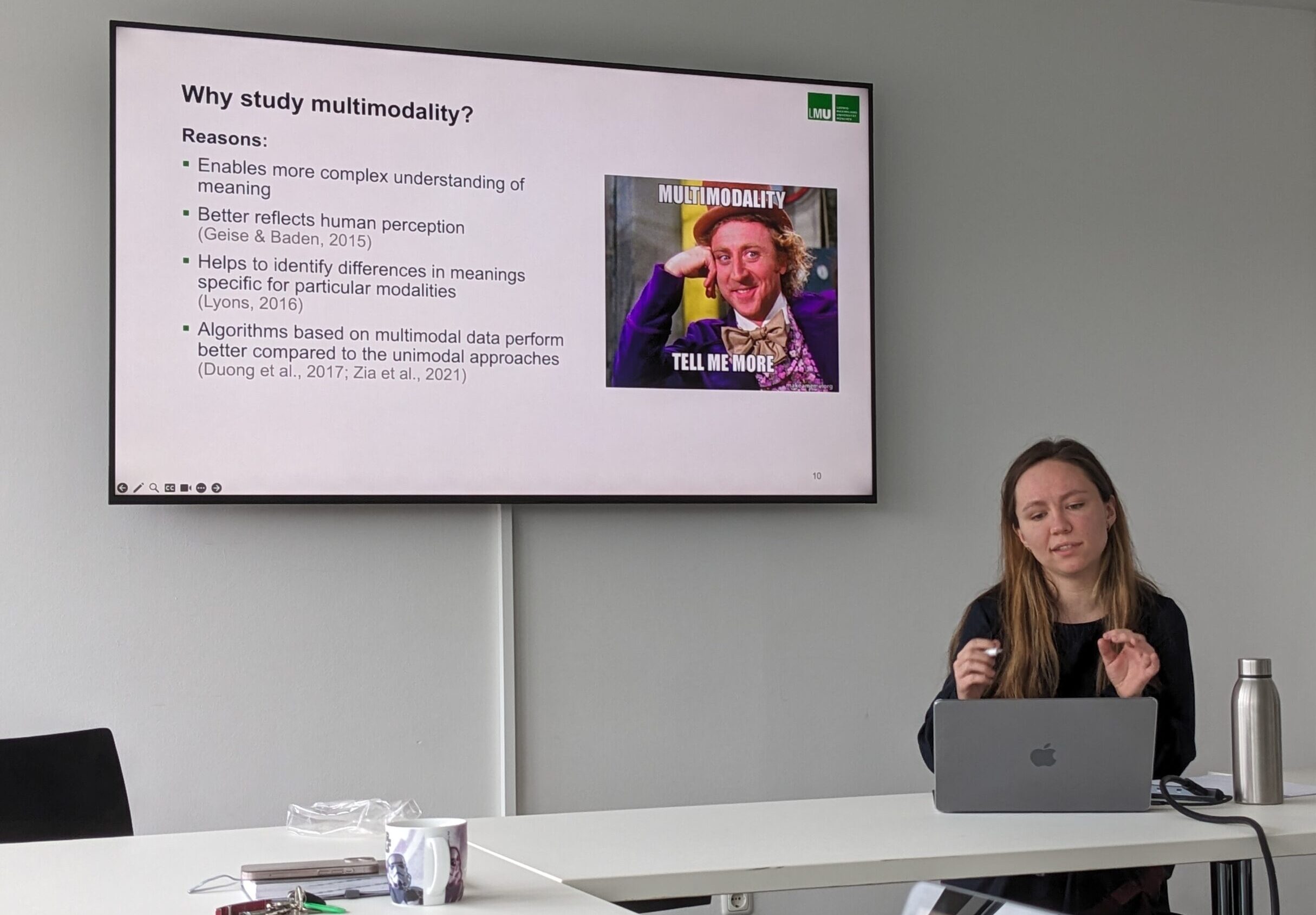
April 17, 2024 | Talk by Nadja Ozornina
Nadja Ozornina presented her work titled „When Multimodal Meets Comparative: Analyzing Multimodal Data in Comparative Context for Computational Communication Research“ to the KLIMA-MEMES team today. Her work aims to develop a methodological approach for computational communication research, which allows for multimodal analyses in comparative contexts. This includes, for example, the combined automated analysis of image and text content in social media posts in various languages.
Since October 2023, Nadja Ozornina has been a doctoral student at the Institute of Communication Science Munich and in the Computational Communication Research department. She also works as a research associate in the KLIMA-MEMES project. Before joining the project, she studied at the Higher School of Economics in Moscow and at LMU Munich.
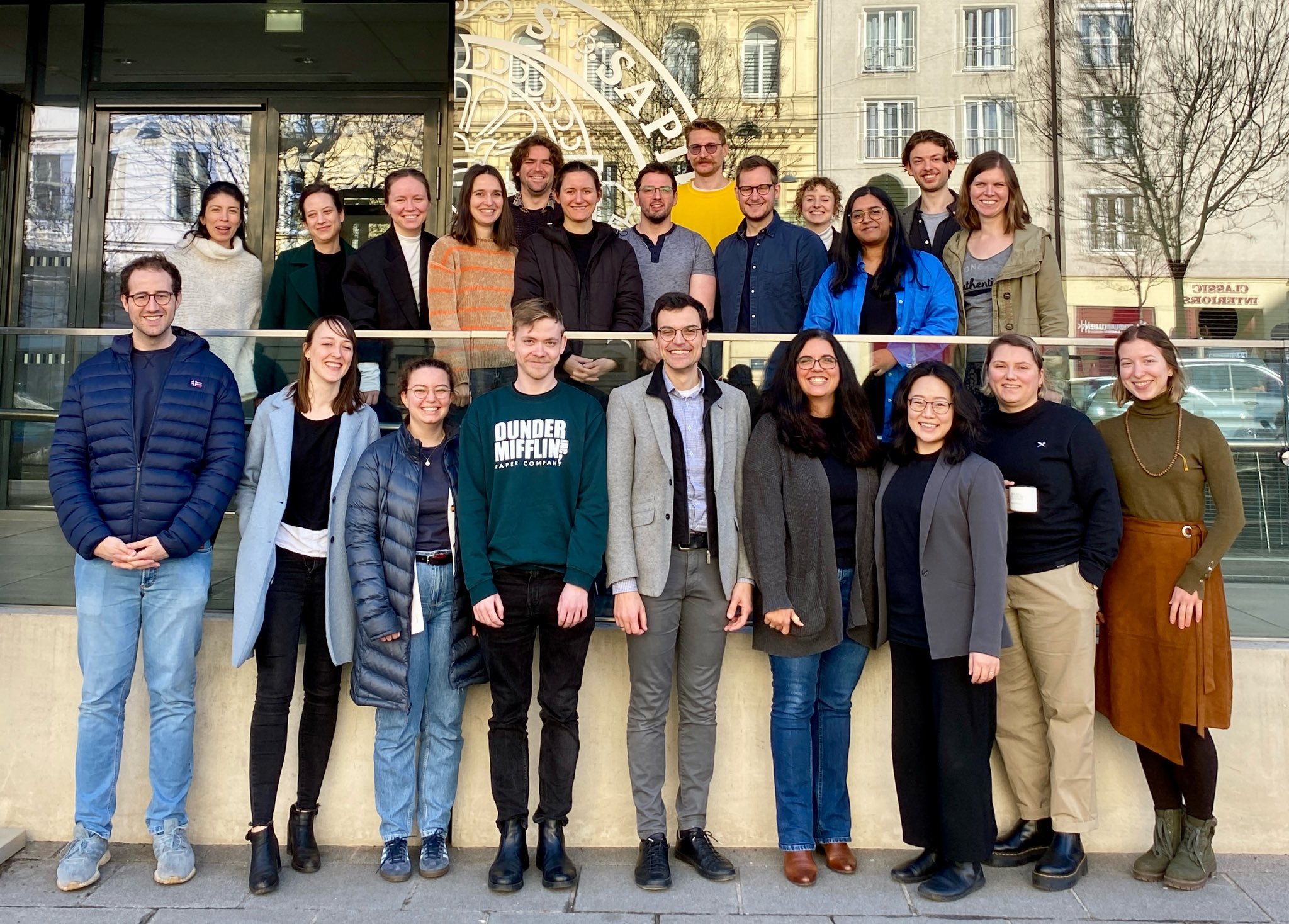
February 16, 2024 | Challenges and Approaches in Interdisciplinary Research
Researchers from the Klima-Memes project took part in a networking meeting at the University of Vienna on February 15 and 16. As part of the meeting with colleagues from the Computational Communication Science Lab, Mario Haim, Nadja Ozornina and Simon Lübke presented initial results from the Klima-Memes project. The talk also included considerations on the challenges and approaches in interdisciplinary research projects. We would like to thank Prof. Annie Waldherr and Prof. Hajo Boomgaarden for the organization and their hospitality.
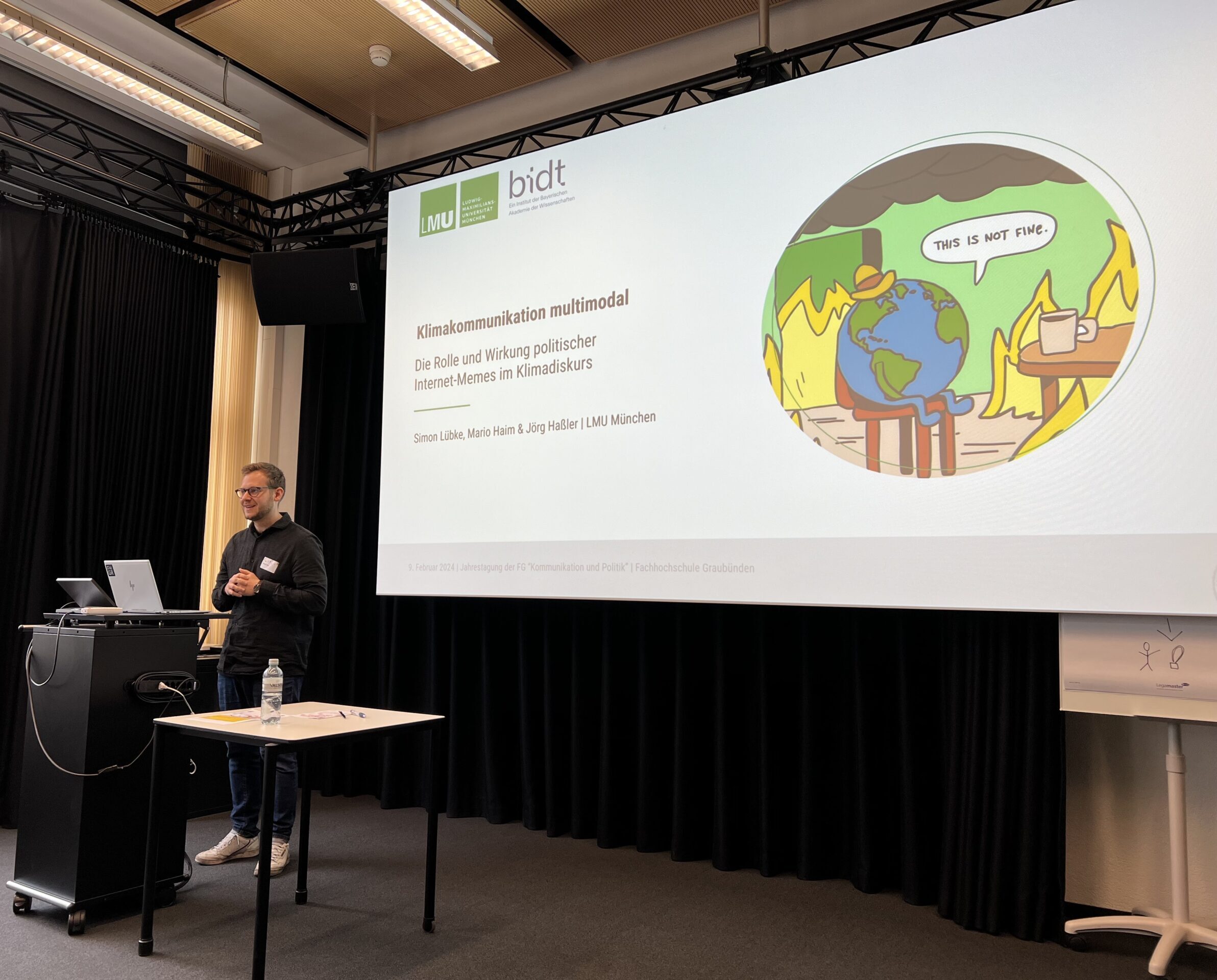
February 9, 2024 | DGPuK Political Communication Conference
Simon Lübke, Mario Haim and Jörg Haßler presented findings from the KLIMA-MEMES project at the annual conference of the „Communication and Politics“ section of of the German Communicaiton Association (DGPuK). The presentation was entitled „Climate communication multimodal: The role and effect of political internet memes in the climate discourse“. The conference took place from February 7 to 9 at the FH Graubünden in Bern on the topic of „Politics Multimedal“. The conference was jointly organized by the „Communication and Politics“ section of the DGPuK, the „Politics and Communication“ working group of the German Political Science Association (DVPW) and the „Political Communication“ section of the Swiss Society for Communication and Media Studies (SGKM).
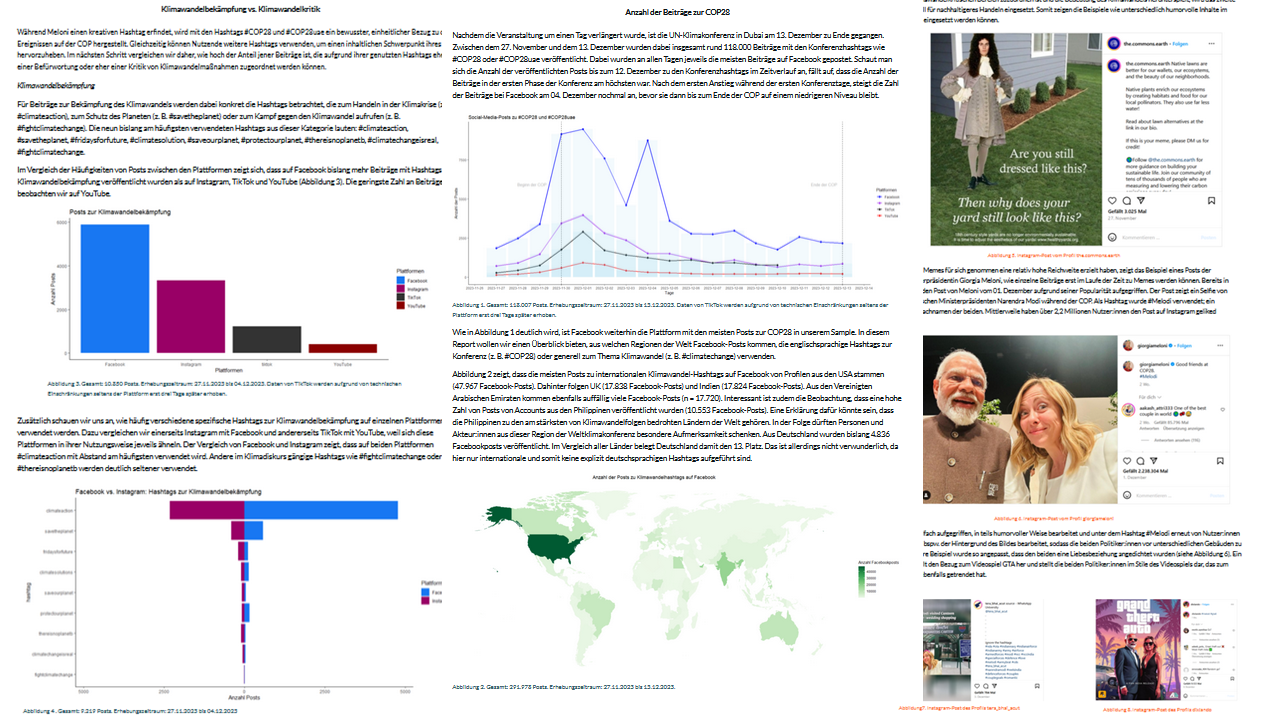
December 21, 2023 | Data Collection and COP28 Reports
From November 30 to December 13, the UN Climate Conference COP28 took place in Dubai. As part of the KLIMA-MEMES project, we collected social media posts on Facebook, Instagram, TikTok, and YouTube during the conference. Social media posts were included in our database if they used hashtags related to the climate conference, such as #COP28, or topics like climate change, for example, #climatechange. Additionally, we collected posts published by relevant actors in the German climate discourse. While we collected the data, we conducted first analyses of the social media communication during COP28 and published the our initial results in three reports. The reports focus on a comparison of the different social media platforms (Report 1), communication from relevant actor profiles (Report 2), and humorous content related to climate change, such as Political Internet Memes.
The reports can be read on this website under the section „COP28“.
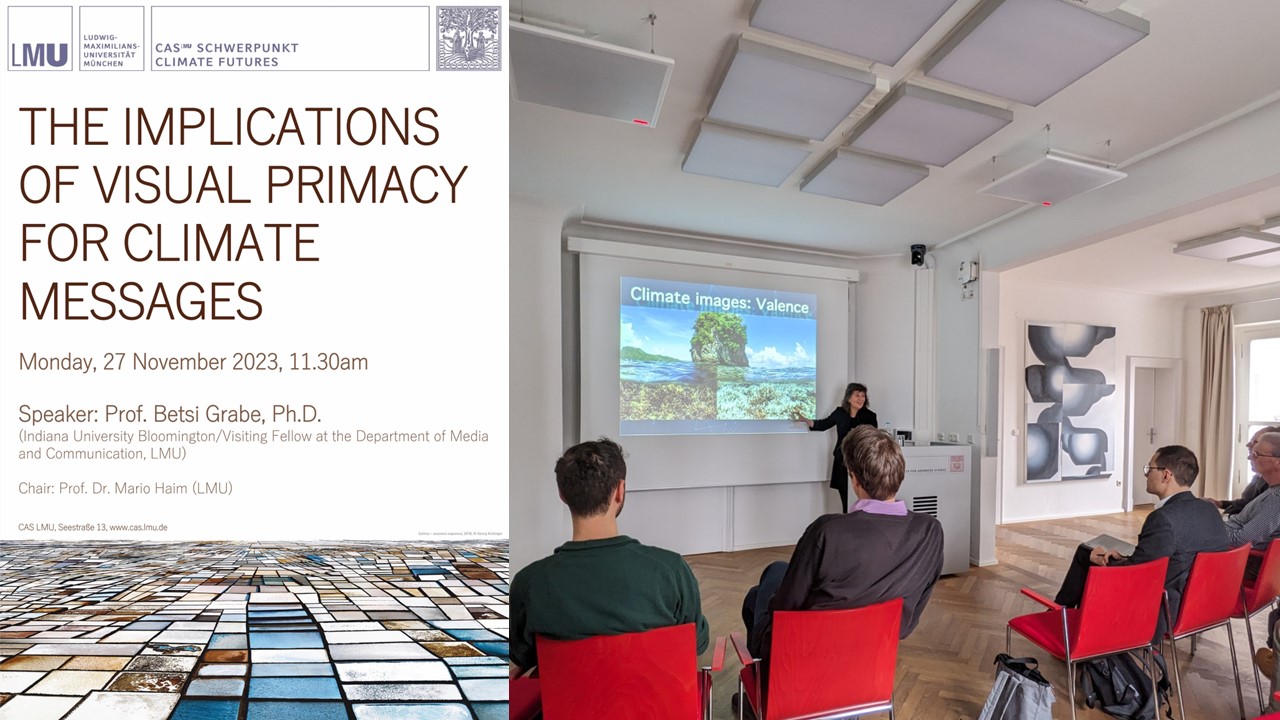
November 27, 2023 | Research visit and CAS Lecture by Prof. Betsi Grabe
Professor Maria Elizabeth (Betsi) Grabe from Indiana University Bloomington visited the Department of Media and Communication Research in November at the invitation of the project team. As a leading researcher in the field of visual communication, Prof. Grabe serves as an international expert for the KLIMA-MEMES project. During her stay, she provided valuable guidance to colleagues involved in the KLIMA-MEMES project, particularly in the planning of the analysis of climate change memes. Furthermore, on November 27th, as part of the Climate Futures lecture series organized by the Center for Advanced Studies at LMU, Prof. Grabe had a talk titled „The Implications of Visual Primacy For Climate Messages.“
Abstract: Neuro and cognitive scientists have built the case for visual primacy over other forms of communication and meaning making by documenting (1) specialized centers in the human brain dedicated to visual processing (2) the speed with which visuals are processed, (3) the efficiency with which visual stimuli are classified and stored in memory, and (4) the way the visual system engages both emotional and “thinking” centers in the brain. This talk will present a review of the power of visuals on the one hand and the difficulties of effectively employing them in climate messages.
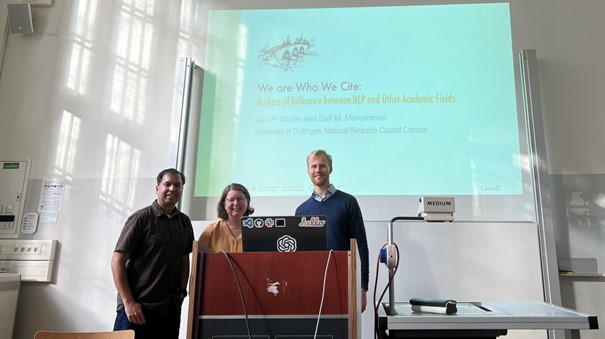
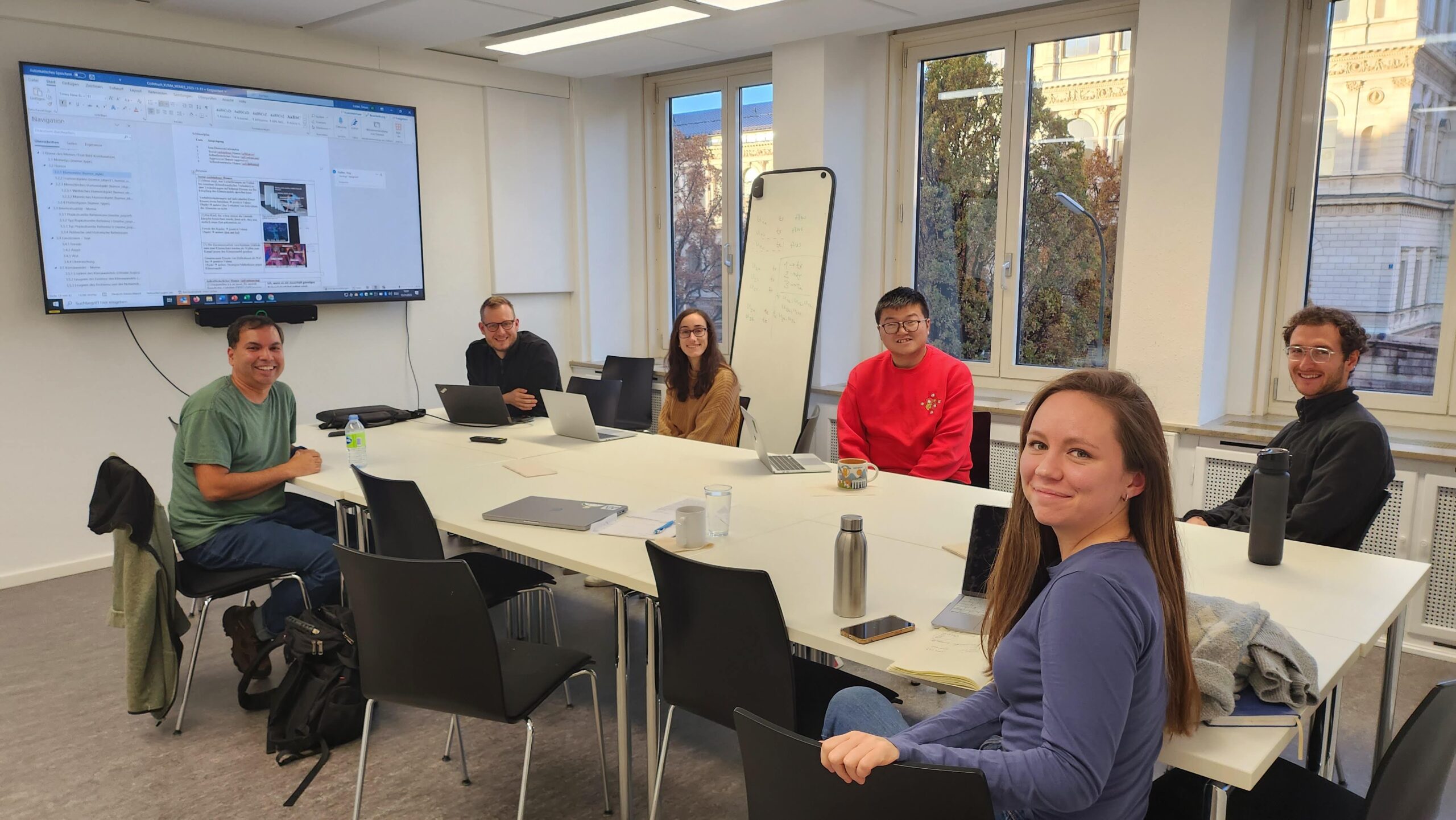
November 20, 2023 | Research visit and talk by Dr. Saif M. Mohammad
Dr. Saif M. Mohammad, Senior Research Scientist from the National Research Council Canada (NRC) and an external consultant for the KLIMA-MEMES project, recently visited Prof. Barbara Plank and the MaiNLP research lab in November. During his visit, he engaged with project members in discussions about the ongoing progress of the KLIMA-MEMES project and the manual annotation process of climate memes. On November 20, Dr. Mohammad, alongside Jan Philip Whale from the University of Göttingen, presented their collaborative project titled „We are Who We Cite: Bridges of Influence Between Natural Language Processing and Other Academic Fields“ at LMU.
Abstract: Natural Language Processing (NLP) is poised to substantially influence the world. However, significant progress comes hand-in-hand with substantial risks. Addressing them requires broad engagement with various fields of study. Yet, little empirical work examines the state of such engagement (past or current). In this paper, we quantify the degree of influence between 23 fields of study and NLP (on each other). We analyzed ~77k NLP papers, ~3.1m citations from NLP papers to other papers, and ~1.8m citations from other papers to NLP papers. We show that, unlike most fields, the cross-field engagement of NLP, measured by our proposed Citation Field Diversity Index (CFDI), has declined from 0.58 in 1980 to 0.31 in 2022 (an all-time low). In addition, we find that NLP has grown more insular — citing increasingly more NLP papers and having fewer papers that act as bridges between fields. NLP citations are dominated by computer science; Less than 8% of NLP citations are to linguistics, and less than 3% are to math and psychology. These findings underscore NLP’s urgent need to reflect on its engagement with various fields.
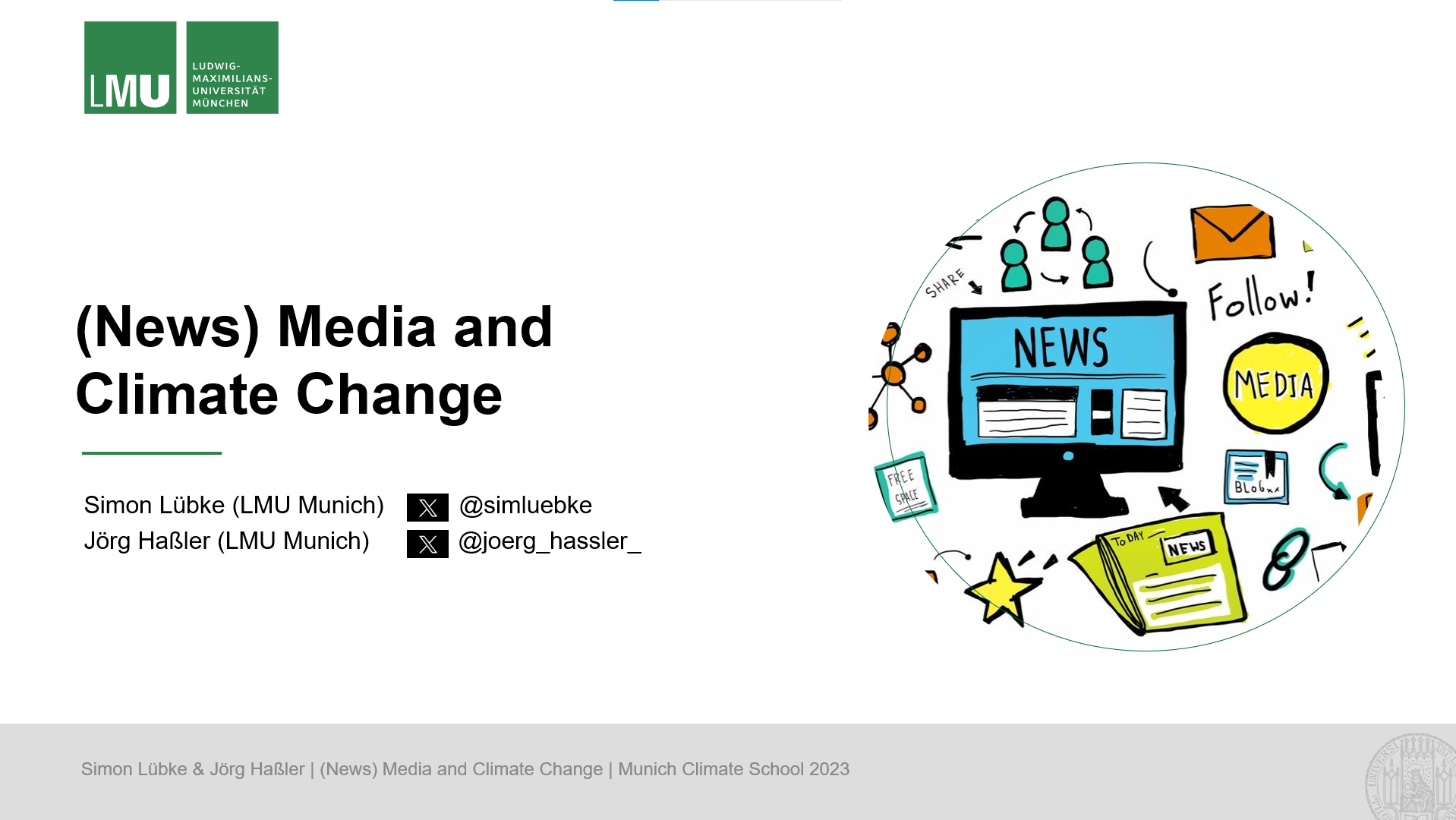
October 13, 2023 | Workshop Munich Climate School
From October 9 to October 13, 2023, the third Munich Climate School took place. At the Munich Climate School of LMU, students and educators from all disciplines come together to network. The goal of this interdisciplinary educational event is to comprehensively understand climate change in order to take proactive measures against it. As part of the event, Simon Lübke and Jörg Haßler from the KLIMA-MEMES team conducted a workshop titled „(News) Media and Climate Change.“
Abstract: The workshop provides an overview of the crucial role that (news) media play in the public discourse on climate change. Participants will learn about the fundamental processes of journalistic news reporting on climate change and understand the influence of news media in shaping public opinion and political actions on climate change. Based on current examples from the German climate discourse, we will explore how different news media report about climate change and discuss relevant factors that explain differences in the frequency and tonality of climate change reporting. We further discuss how political actors can gain public visibility by adapting to these and other factors. The workshop will also address current trends in climate communication, such as the use of political internet memes in online discussions on social media.
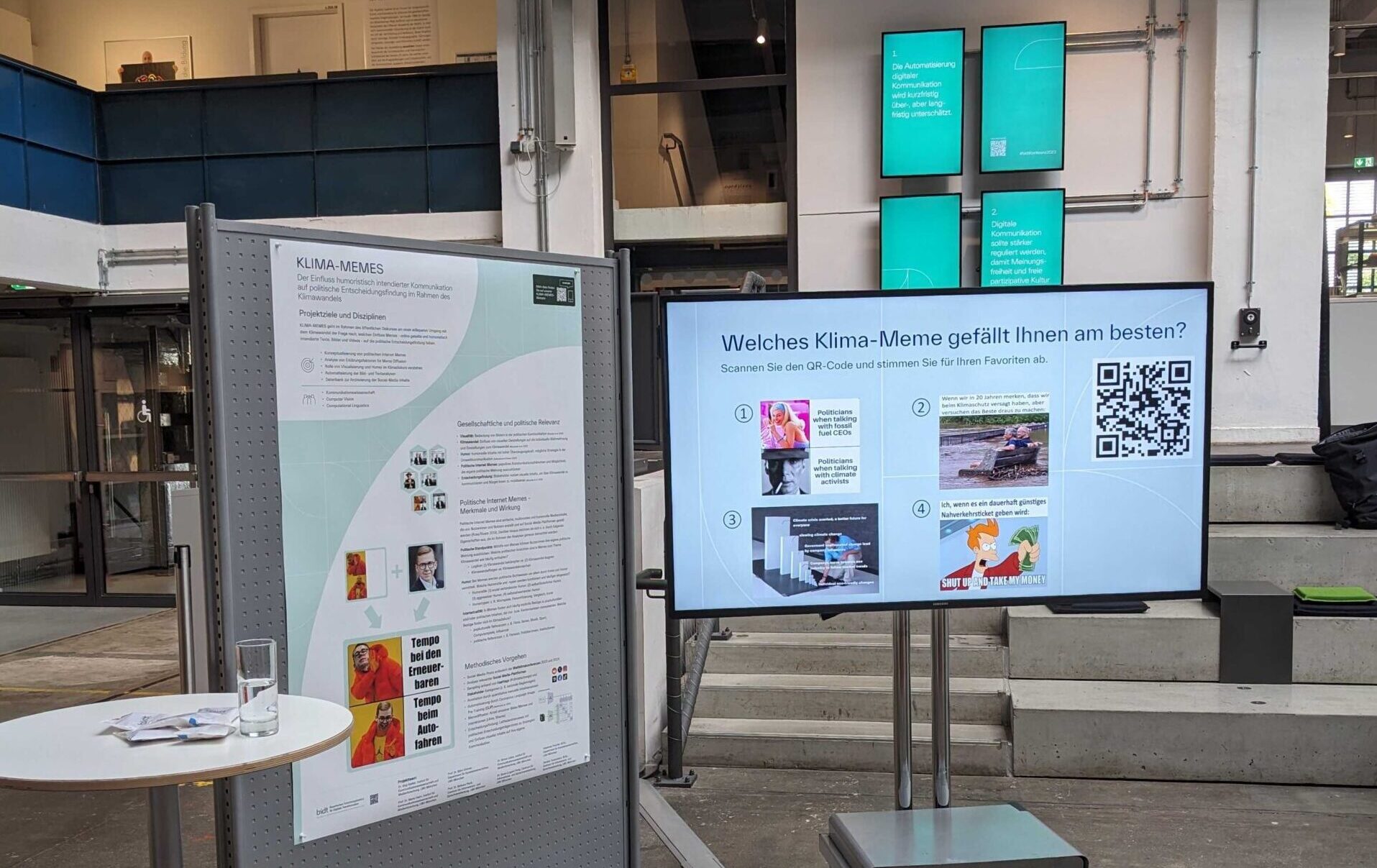
October 12, 2023 | bidt Conference Poster
From October 11 to 12, the bidt Conference 2023 took place in Munich. The conference theme was „Communicating Digitally – Communicating the Digital.“ During the conference, Simon Lübke and Johannes Fischer from the KLIMA-MEMES team presented the topic and the current status of the research project through a poster and engaged in discussions with interested participants about the project. Attendees also had the opportunity to vote for their favorite climate meme from a selection of four different memes during the conference.
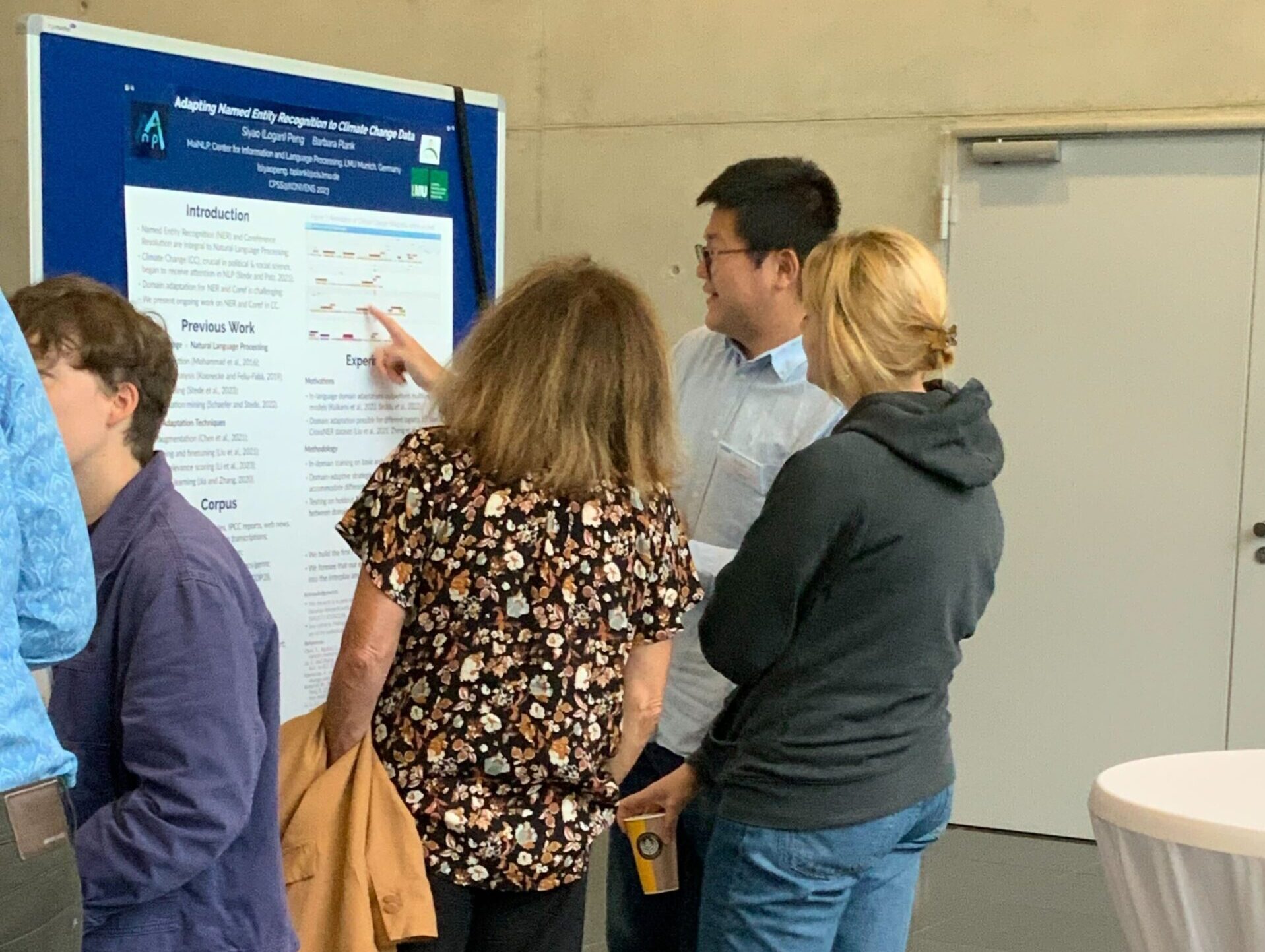
September 19, 2023 | KONVENS Conference Poster
Siyao (Logan) Peng and Barbara Plank from MaiNLP and part of the KLIMA-MEMES team attended the last annual conference of computational linguistics KONVENS in Ingolstadt and presented a research poster. Their submission is titled „Adapting Named Entity Recognition to Climate Change Data“ and focuses on the method of Named Entity Recognition (NER), which the authors apply in their study to a corpus on climate change .
Short abstract: The study discusses the importance of Named Entity Recognition (NER) in Natural Language Processing (NLP) for various tasks. It also highlights the emerging role of NER in the context of Climate Change (CC) and introduces ongoing research on adapting NER to the CC domain. The study involves creating a new Climate-NER corpus, conducting experiments, and exploring domain-adaptation strategies. The research aims to enhance NER models for the CC domain, providing valuable insights into the interplay between domains, genres, and languages in model adaptation.
Peng, S. & Plank, B. (2023). Adapting Named Entity Recognition to Climate Change Data. Poster presented at CPSS@KONVENS 2023.

September 06, 2023 | Excited to see the memes – Interview about Olaf Scholz and Memes
The German chancellor, Olaf Scholz, generated excitement across social media with a photo he shared after a jogging accident. The image depicted him wearing a black eyepatch, accompanied by a caption that read, „Thanks for the well wishes. It looks worse than it is!“ He playfully added, „Excited to see the memes.“ In a recent interview conducted by the German news website DerWesten, our colleague from KLIMA-MEMES, Jörg Haßler, delves into Olaf Scholz’s social media strategy, discusses the potential impact of this post, and underscores the significance of internet memes in the realm of political communication.
The interview was conducted by Marisa Lattemann and can be accessed via the following link:
Lattemann, M. (2023, September 6). Ist das sein Merkel-Moment? Kanzler Scholz plötzlich sympathisch. DER WESTEN.
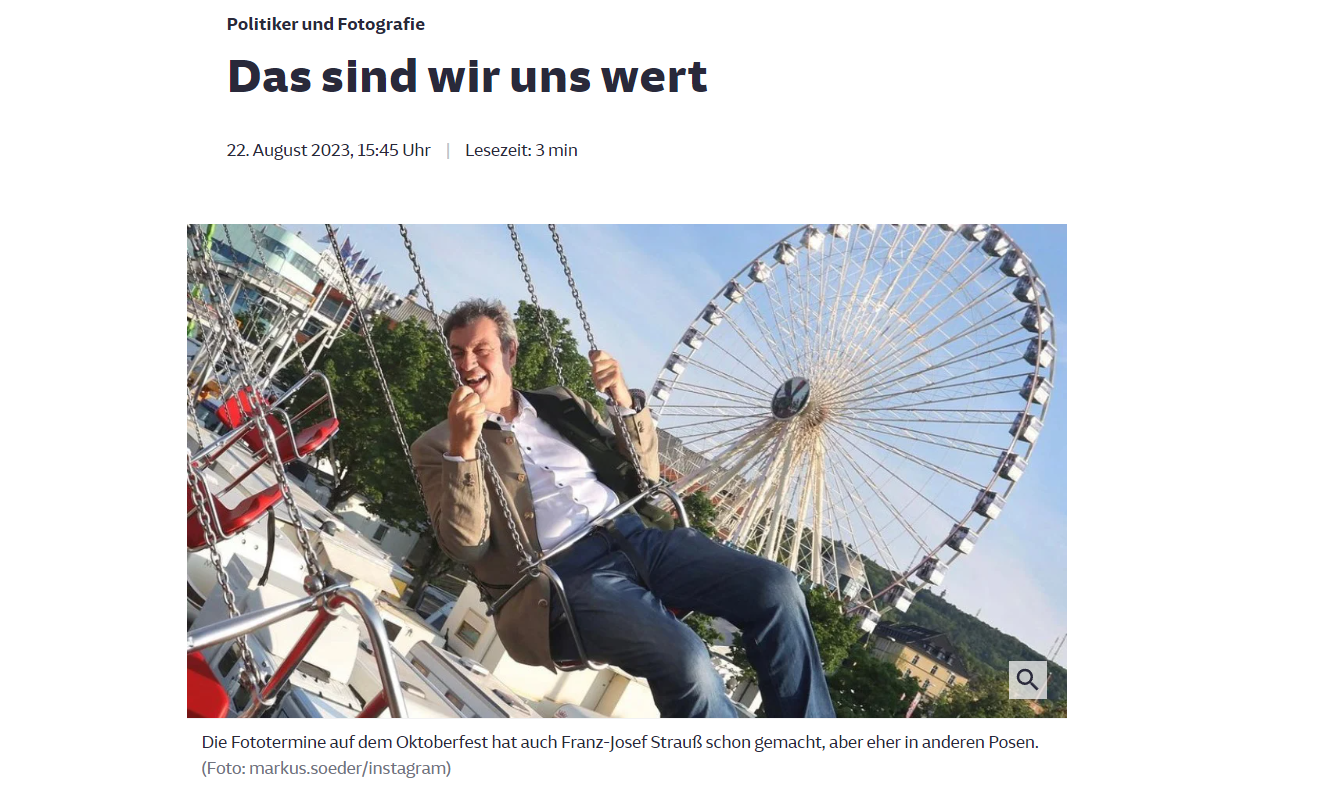
August 23, 2023 | News Article on Politicians‘ Social Media Profiles
On August 23, 2023, the German newspaper Süddeutsche Zeitung (SZ) published an article on German politicians’ strategies and practices of self-presentation in social media. The article by Sonja Dawson also refers to current research
results by KLIMA-MEMES colleague Jörg Haßler on the visual self-representation of parties and politicians on Instagram. The study by the LMU scholars Jörg Haßler, Anna-Katharina Wurst, and Katharina Pohl mentioned in the article
was recently published in 2023 in the Journal Information, Communication & Society. The study shows that personal depictions of parties and candidates are common in Instagram campaigns while addressing policy issues in posts
varies between elections. The study and the newspaper article refering to its results can be accessed via the following links:
Haßler, J.; Wurst, A.-K.; Pohl, K. (2023). Politicians over issues? Visual personlization in three Instagram election campaigns. Information, Communication & Society, 1–21.
Dawson, S. (2023, 23. August). Politiker und Fotografie: Das sind wir uns wert. Süddeutsche Zeitung.
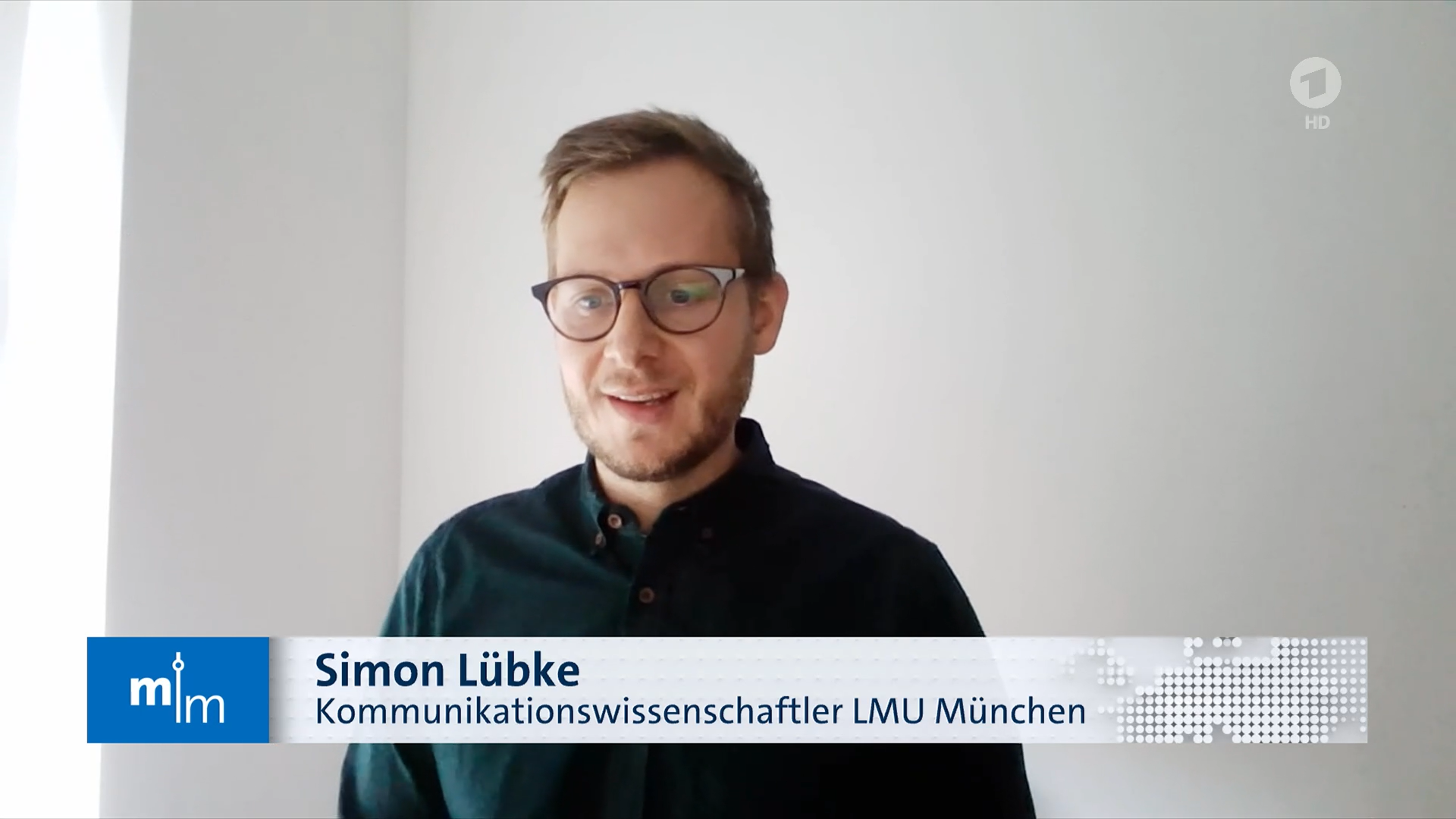
August 08, 2023 | Interviews on Visualization in Political Communication
The Bavarian state election will be held on October 8 this year. In light of these events, the KLIMA-Memes colleague Simon Lübke was interviewed twice on the topic of visualization of political communication. on social media. The feature on self-presentation in politics explores the question whether or not it is reasonable for politicians to spend more money on professional social media performances. The video produced by Julia Brestrich was released on 08 August 2023 and can be accessed via the following link:
In a feature of the public service news magazine, ARD-Mittagsmagazin.
Brestrich, J. (2023, 8. August). Selbstinszenierung in der Politik. ARD mittagsmagazin.
In an interview with the Mittelbayerische Zeitung (MZ), he commented on the relevance and effects of election campaign posters and the strategies of German parties in the city of Regensburg. The article by Juliana Ried with the interview was published on August 3 and can be accessed via the following link:
Ried, J. (2023, 3. August). Sind diese Regensburger Wahlplakate Stimmenbringer? Mittelbayerische Zeitung.
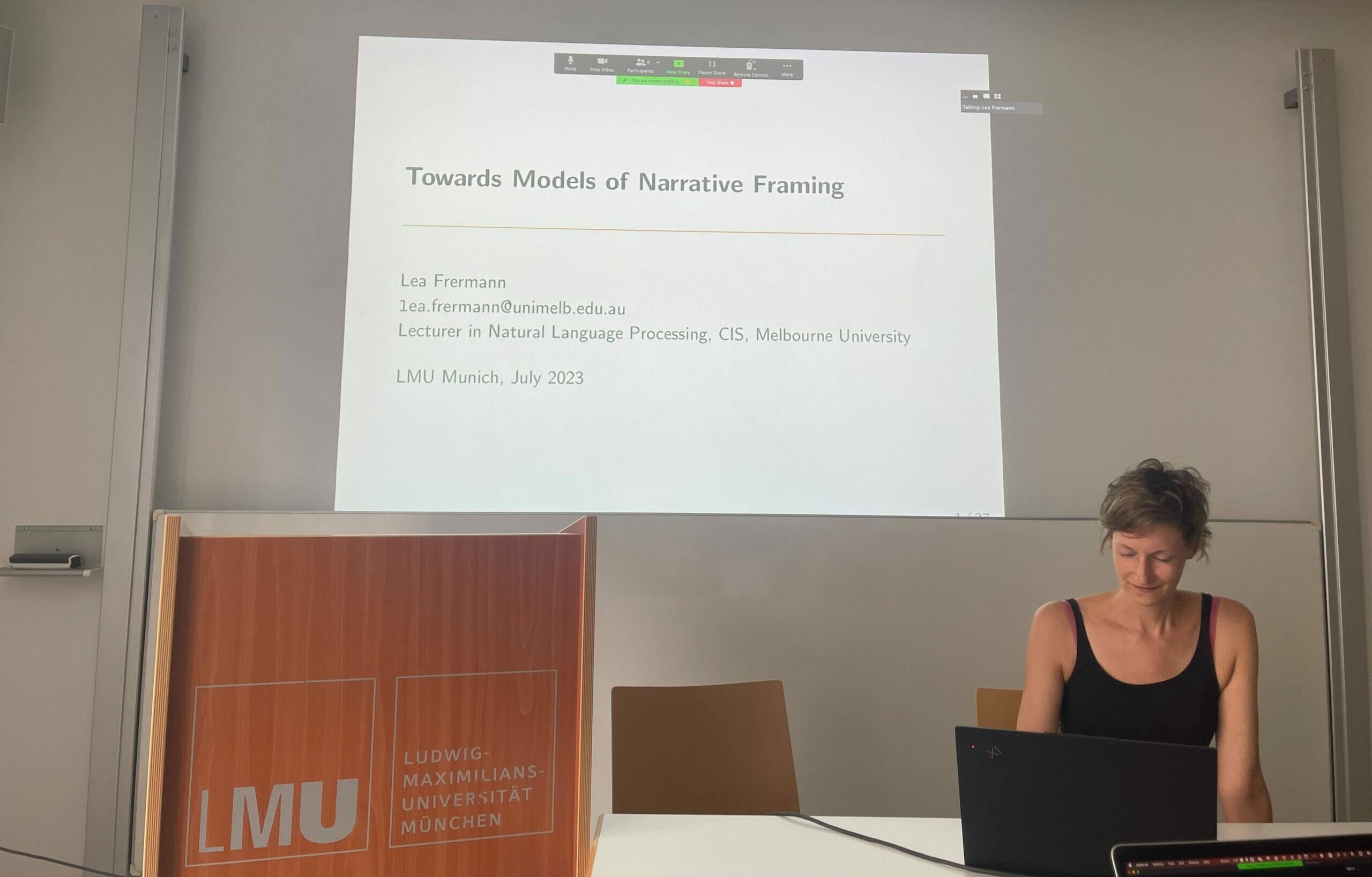
July 14, 2023 | Talk by Dr. Lea Frermann
Dr. Lea Frermann from the University of Melbourne visited Prof. Barbara Plank and the MaiNLP research lab today and presented her research on “Conflicts, Villains, Resolutions: Towards models of Narrative Media Framing”. Her talk focused on the application of NLP approaches for automatic frame prediction in the climate change discourse.
Abstract: Stories have existed as long as human societies, and are fundamental to communication, culture, and cognition. This talk looks at the interaction of narratives and media framing, i.e., the deliberate presentation of information to elicit a desired response or shift in the reader’s attitude. While rich theories of media framing have emerged from the political and communication sciences, NLP approaches to automatic frame prediction tend to oversimplify the concept. In particular, current approaches focus on overly localized lexical signals, make unwarranted independence assumptions, and ignore the broader, narrative context of news articles. This talk presents our recent work which incorporates narrative themes, roles of involved actors, and the interaction multiple frames in a news article as a step towards a computational framework of narrative framing. Quantitative evaluation and case studies on media framing of climate change reflect a benefit of the more nuanced emerging frame representations.
Bio: Dr. Lea Frermann is a lecturer (assistant professor) and DECRA fellow at the University of Melbourne. Her research combines natural language processing with the cognitive and social sciences to understand how humans learn about and represent complex information and to enable models to do the same in fair and robust ways. Recent projects include models of meaning change; of common sense knowledge in humans and language representations; and automatic story understanding in both fiction (books or movies) and the real world (as narratives in news reporting on complex issues like climate change).
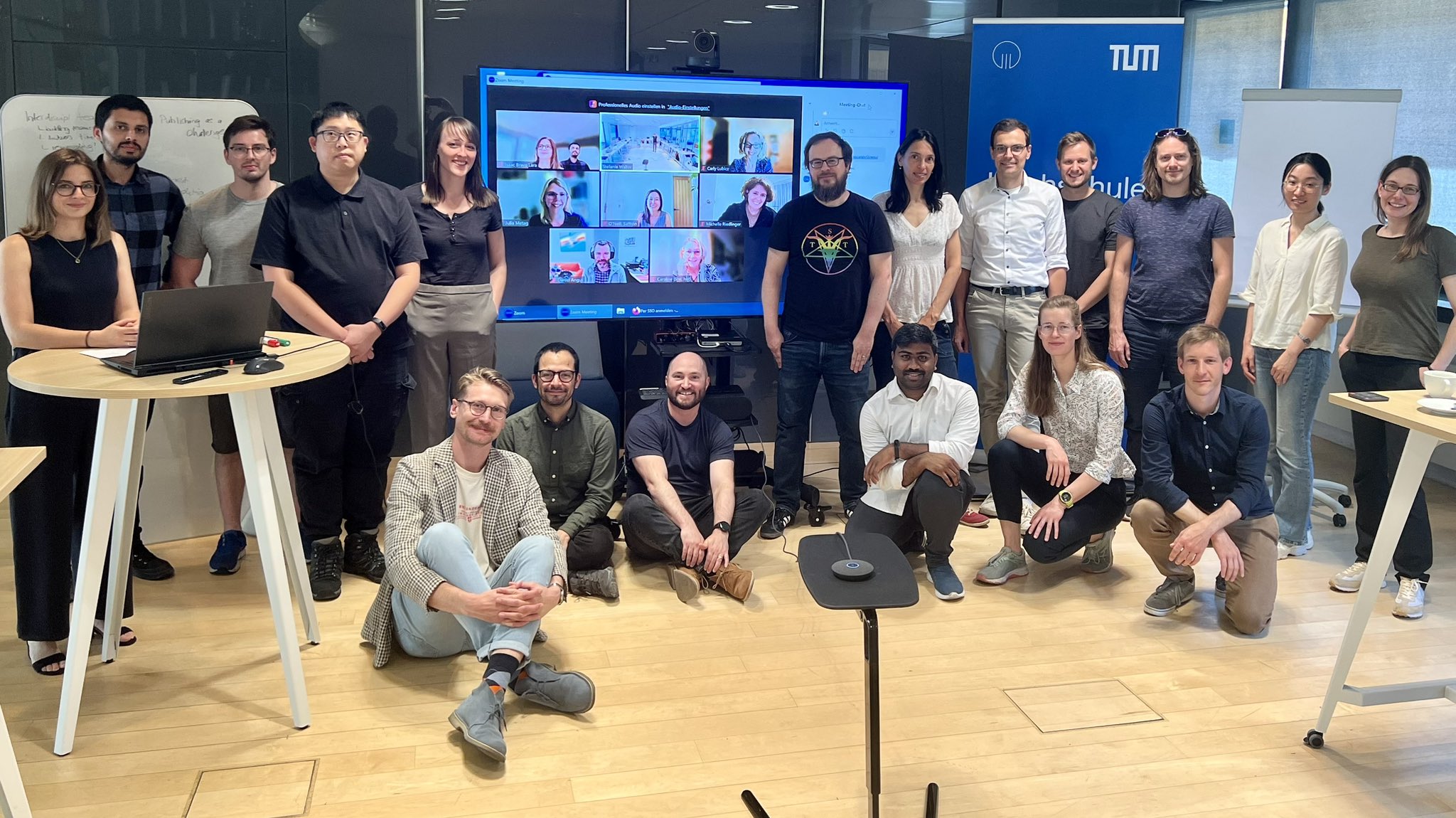
June 13, 2023 | Climate Change Visuals Workshop at TU Munich
Prof. Dr. Mario Haim and Dr. Simon Lübke attended a workshop on Climate Change Visuals at the Technical University of Munich today. The workshop was hosted by Stefanie Walter, PhD (TU Munich) and Prof. Dr. Mike S. Schäfer (University of Zurich) and brought together international social and computer scientists who work with computational approach to analyze climate change visuals. The participants discussed challenges and opportunities of communication climate change via images and shared experiences and insights on visualizing climate change data in social sciences research and practice.
Workshop summary: Computational methods are becoming increasingly popular among social scientists. Large amounts of data are being generated and made publicly available every day. However, it is still only a small number of researchers who have the methodological knowledge or are skilled in using computational methods which make this data so valuable. Large scale initiatives, such as quanteda have lowered the barriers to use Natural Language Processing and quantitative text analysis methods. However, these endeavours have to a very large extent been limited to textual data, following the traditional approach to content analysis that is focused on texts. Images and advances in the area of image analysis have been neglected, leaving gaps in the potential that these data sources offer. This is a big omission given that images are especially prevalent in online environments and on social media in particular. In this workshop, we want to bring together scholars working on image analysis (especially with focus on climate change) and discuss questions related to data access and analysis. Regarding the latter, we are particularly interested in exploring the challenges and opportunities that collaborations with computer scientists bring.
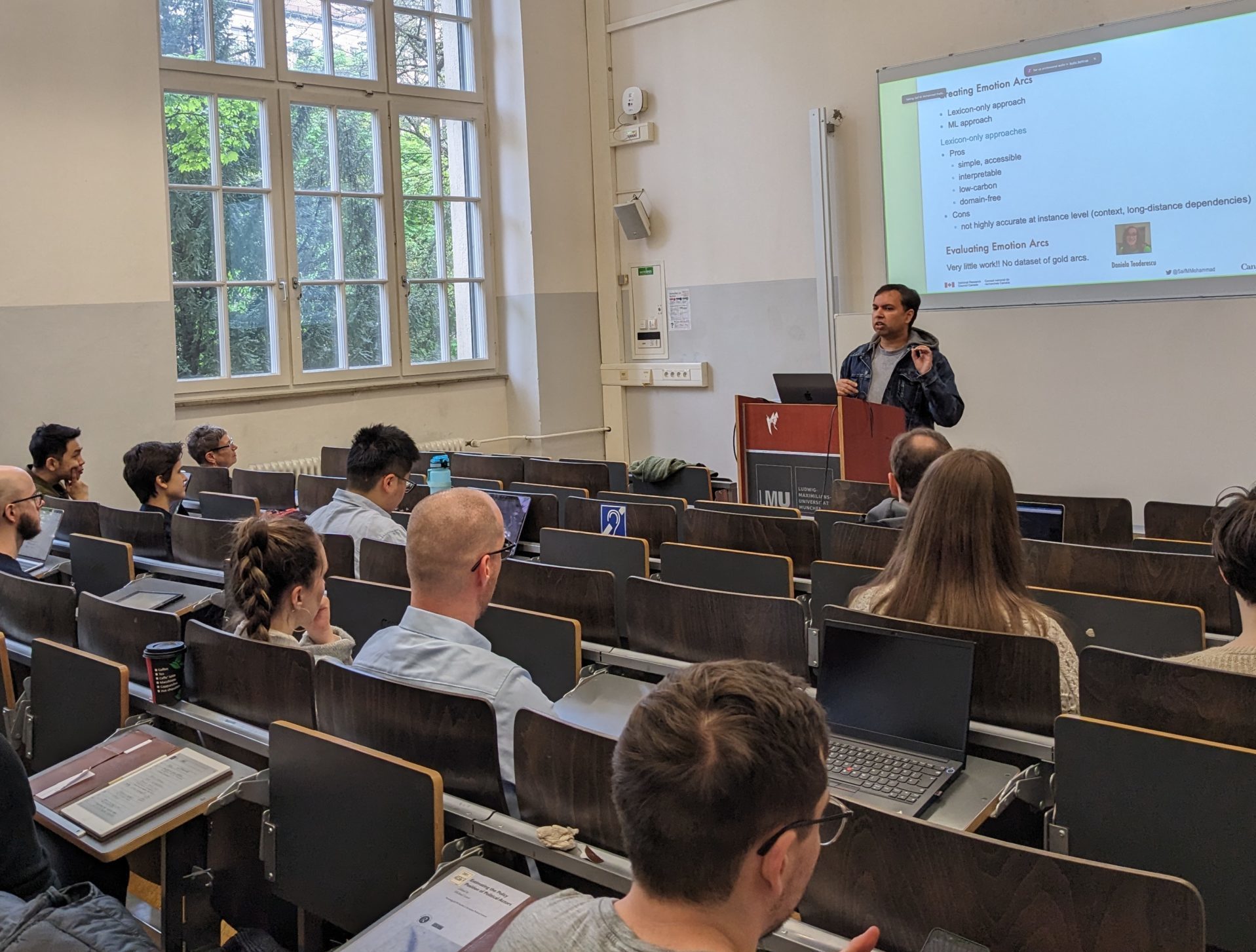
May 8, 2023 | Talk by Dr. Saif M. Mohammad
Dr. Saif M. Mohammad from the National Research Council Canada (NRC) visited Prof. Barbara Plank and the MaiNLP research lab today and presented his research on “The Search for Emotions, Creativity, and Fairness in Language“. Dr. Mohammad is a leading expert in computational linguistics and his research focuses on emotions in Language. He serves as an external consultant for the KLIMA-MEMES project.
Abstract: Emotions are central to human experience, creativity, and behavior. They are crucial for organizing meaning and reasoning about the world we live in. They are ubiquitous and everyday, yet complex and nuanced. In this talk, I will describe our work on the search for emotions in language — by humans (through data annotation projects) and by machines (in automatic emotion and sentiment analysis systems). I will outline ways in which emotions can be represented, challenges in obtaining reliable annotations, and approaches that lead to high-quality annotations and useful sentiment analysis systems. I will discuss wide-ranging applications of emotion detection in natural language processing, psychology, social sciences, digital humanities, and computational creativity. Along the way, I will discuss various ethical considerations involved in emotion recognition and sentiment analysis — the often unsaid assumptions and the real-world implications of our choices.
Bio: Dr. Saif M. Mohammad is a Senior Research Scientist at the National Research Council Canada (NRC). He received his Ph.D. in Computer Science from the University of Toronto. Before joining NRC, he was a Research Associate at the Institute of Advanced Computer Studies at the University of Maryland, College Park. His research interests are in Natural Language Processing (NLP), especially Lexical Semantics, Emotions and Language, Computational Creativity, AI Ethics, NLP for psychology, and Computational Social Science. He is currently an associate editor for Computational Linguistics, JAIR, and TACL, and Senior Area Chair for ACL Rolling Review. His word–emotion resources, such as the NRC Emotion Lexicon and VAD Lexicon, are widely used for analyzing emotions in text. His work has garnered media attention, including articles in Time, SlashDot, LiveScience, io9, The Physics arXiv Blog, PC World, and Popular Science.
The KLIMA-MEMES project is funded by the Bavarian Research Institute for Digital Transformation.
